

LANTERN
COLUMBIA THEOLOGICAL SEMINARY
Summer 2025 • The Year in Review




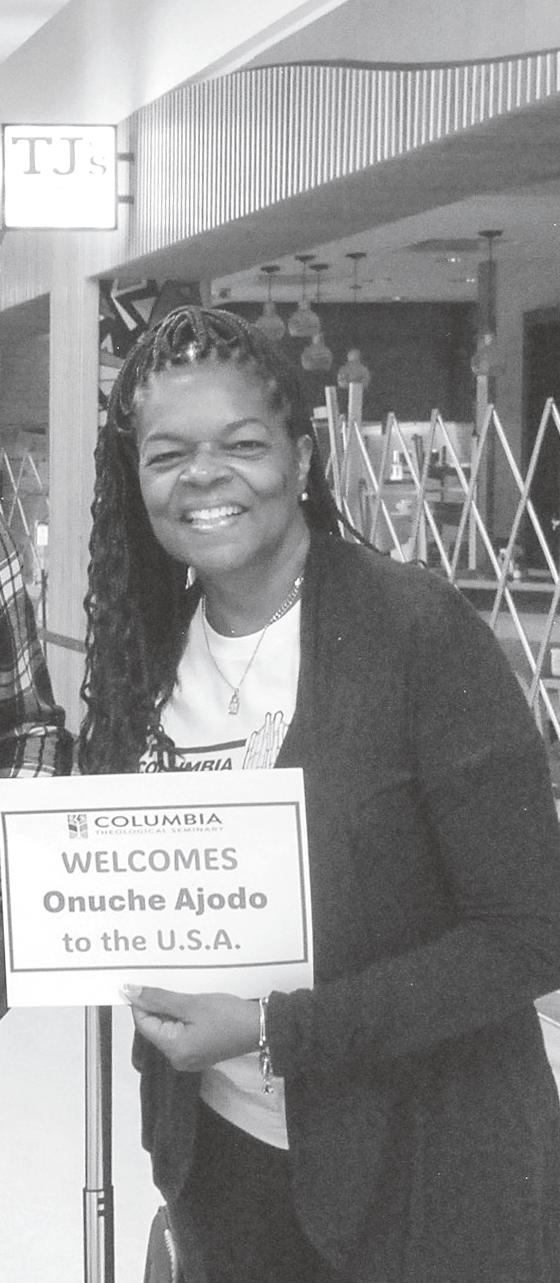
“HOSPITALITY IS NOT JUST A GESTURE; IT IS THE WARMTH THAT TURNS A NEW PLACE INTO A HOME. FROM THE FIRST WELCOME AT THE AIRPORT TO THE KINDNESS OF HELPING HANDS, I HAVE FELT NOT LIKE A STRANGER, BUT LIKE I TRULY BELONG.”
ONUCHE AJODO, MDIV ’ 27



WELCOME TO THE INAUGURAL ISSUE OF
LANTERN, Columbia Theological Seminary’s exciting new printed and online periodical. We are proud to build upon the legacy of Vantage, which has served us well for many years as a vital communication tool.
This inaugural issue serves as a “Yearbook” documenting the events, achievements, and challenges faced by Columbia Seminary as it progresses in its mission, vision, and strategic objectives. The institution is dedicated to “Forming Pastoral Leaders to Renew Christ’s Church and Transform the World.” This publication will play a crucial role in highlighting key milestones as the seminary approaches its 100th anniversary in Decatur, GA, and prepares for its 200th anniversary in 2028-2029. These celebrations mark significant contributions to the Church through the development of servant-leader-scholars. Lantern will also showcase the unique aspects of a Columbia Theological Seminary education as the institution embarks on its third century of service.
This publication highlights numerous achievements and developments at Columbia Seminary. Key features include a new enrollment commitment, faculty recognition through research and publications, and notable student achievements in the form of research awards and fellowships. The institution has received regional, national, and international honors, indicating a productive year in both academic and classroom settings. Columbia Seminary continues to fulfill its mission as an educational institution of the Presbyterian Church (USA), fostering a community focused on theological inquiry, leadership development, and ministry formation in service to the Church of Jesus Christ.
We stand at the threshold of a transformative commitment as we enter our third century, dedicated to ensuring that every individual—regardless of cultural lineage, theological perspective, sexual identity, or denominational affiliation—is honored by their name, never reduced to a number or a category. Our devoted staff tirelessly supports our mission around the clock, while our alumni shine brightly across Georgia, the Southeast, the United States, and around the globe.
In response to the abundant grace and generosity of God, LANTERN will serve as Columbia Theological Seminary’s vibrant online and printed periodical, dedicated to articulating our steadfast conviction as a cornerstone institution within the Church. As we embark on our journey into the third century, our mission is illuminated by our commitment to call, equip, and nurture resilient pastoral leaders who will serve both the Church and the world, ensuring that through our efforts and the endeavors of our graduates, the transformative message of God’s liberating love resonates far and wide.
Amidst a rapidly changing landscape, we deeply understand the Church’s evolution and its call for adaptive leadership. Columbia will steadfastly prioritize the formation of strong and resourceful pastoral leaders, not only for our congregations within the Presbyterian Church (USA) but also across a diverse array of denominations. Our vision extends beyond traditional boundaries, preparing our graduates to embrace pastoral leadership in various contexts—whether within vibrant congregations, supportive chaplaincies, impactful counseling settings, dedicated non-profit organizations, or other vital ministries. Together, we will forge pathways for a future rich with hope and compassion, firmly rooted in the light of God’s love.
LANTERN is dedicated to sharing the stories of resilient leaders who demonstrate dynamism and diversity in their pursuits. These individuals are making significant impacts as changemakers within their communities. The narratives from Columbia not only connect individuals across the campus but also extend beyond it, transcending different time periods and eras. The subsequent editions of LANTERN will embrace an evolving culture that emphasizes belonging, personal growth, gratitude, hospitality, excellence, and a commitment to enhancing student success.
We find ourselves in a pivotal moment for higher education, yet the mission of Columbia Theological Seminary stands resilient and vibrant. It serves as a beacon, illuminating the path for a bold and relevant proclamation. We are truly grateful for Columbia’s dedication to enriching both mind and spirit, nurturing essential skills, and fostering intellectual growth. Each day, we witness the transformative impact of our institution, which ignites a profound commitment to service and cultivates enduring relationships that empower a lifetime of meaningful ministry.
Transformation is an ongoing journey that unfolds over time, demanding intentional efforts and a courageous spirit to embrace risk, grace, patience, mutual accountability, and understanding. At LANTERN, we are committed to highlighting the remarkable transformations taking place within our community, sharing our experiences openly and fearlessly. We invite you to join us in this illuminating journey, to believe in the vital work we are undertaking and in each other! Together, let’s light the path forward.

President and Professor of Practical Theology
LANTERN IS A TRUE GROUP EFFORT
In April of 2025, students, staff, and faculty gathered to discuss and determine the elements that would become the mission statement and editorial principles that would guide the printed magazine, Lantern , as well as the online components of the publication. The following document is the result of the work by the Strategic Communications staff and folks from the Columbia community.
Lantern
We are guided by Matthew 5:14-16: You are the light of the world. A town built on a hill cannot be hidden. Neither do people light a lamp and put it under a bowl. Instead, they put it on its stand, and it gives light to everyone in the house. In the same way, let your light shine before others, that they may see your good deeds and glorify your Father in heaven.
Mission Statement:
Lantern exists to curate and share diverse narratives from within Columbia Theological Seminary and explore how it advances Christ’s mission by educating and nurturing pastoral leaders for the Church and the world. Lantern will foster meaningful connection by giving light to where Columbia Theological Seminary has been and where we are going while lifting up the present by capturing the stories that define Columbia and its rich ministry.
Lantern is a reliable voice of leadership and hope. It provides a compelling and cohesive narrative drawing readers into a sustaining and robust ecosystem of relationship, partnership, and community and raising our profile by increasing, diversifying, and expanding our audience.
Editorial Principles:
These principles provide clarity on how Lantern embodies Columbia’s core values and how it shares Columbia’s story with the world.
• Accountability: Lantern is accountable to the Columbia community to intentionally represent them and the institution by accurately reflecting the mission, core values, and members of the Columbia Theological Seminary community in its stories and publications.
• Transparency: Lantern shines a light with clarity and discernment so that all can see who Columbia is as an institution and people, educating and nurturing faithful leaders for the Church and the world. It shares stories that are reflective of our mission and clearly shows how we carry out that mission.
• Accessibility: Lantern should be a place that is easily reached, entered, and understood. The needs of our audience are first and foremost and content in both print and digital contexts should be easily used and understood by all.
• Inclusiveness: Lantern represents the whole of Columbia’s community balancing and showcasing our rich diversity by sharing stories of how we uplift the Church and how Columbia and its students share the word of Christ in settings ranging from large and small churches to non-profit organizations to healthcare and beyond. In short, our stories will include a breadth and diversity of opinion where no significant part of our community is under-represented or omitted.

• Compassion: Lantern will act with integrity, sensitivity, and compassion for the storytellers – the students, alumni, faculty, staff, and others – who are willing to take risks by sharing their story with a wider audience. We will offer protection to the vulnerable in our community, and we will respect people’s privacy by only sharing stories that honor the storyteller and are in the public interest.
• Engagement: Lantern welcomes the dynamic engagement of its storytellers and its audience, encouraging a free exchange of ideas that informs public debate and encourages curious, engaged, and critical dialogue.
2024-2025 Lantern Editorial Board:
Wesley Applebury, MDiv/MAPT ’28
Rev. Dr. Victor Aloyo, Jr., President of Columbia Theological Seminary
Julie Bailey, MDiv ’09, Senior Director, Alumni and Church Relations
Lucy Baum, Executive to the President; Director of Strategic Engagement
Vincine Brown, MDiv ’26
Dr. Mark Douglas, J. Erskine Love Professor of Christian Ethics and Lead Professor for the ThM Degree
Chassidy Goggins, MAPT ’24, DEdMin ’28, Media and Marketing Coordinator, Center for Lifelong Learning
Rebekah Groover, Director, Strategic Giving
Ria Martin, Director, Intercultural and Global Services
Emily Peterson, MDiv ’16, Director, Public Services
Dr. Rafael Reyes III, Senior Advisor for Flourishing and Belonging
Dr. Maci Sepp, Director, Vocational Outreach
Dr. Montisa Watkins, MDiv ’25
Dr. William Yoo, Associate Professor of American Religious and Cultural History; Director of MDiv Program
Dr. Christine Roy Yoder, Senior Vice President, Dean of Faculty and Academic Affairs, J. McDowell Richards Professor of Biblical Interpretation
Strategic Communications Staff
Corie Cox, Associate Director, Creative Services
Jennifer Cuthbertson, Senior Director, Strategic Communications
Add Seymour, Jr., Associate Director, Strategic Communications
LIVING INTO OUR VALUE OF HOSPITALITY
In what has become a favorite annual tradition, staff, students, and faculty gathered in late July to set up dorm rooms for incoming international students with essentials to begin their lives and studies at Columbia. Bedding and linens, toiletries, and basic kitchenware are placed, along with welcome notes and snacks to welcome the weary travelers to their new living quarters.
When the international students arrive, and after they are picked up at the airport, they have a quiet, comfortable place to relax before orientation.
For the last three years, the Columbia community has gathered to pray, prepare the rooms, and learn a little more about the incoming international students before their arrival.









LIVING INTO OUR VALUES OF BECOMING & BELONGING AND INCLUSIVE COMMUNITY
It began with the International Students orientation, two days packed with informative sessions, practical advice and a bit of fun,
Then all incoming students participated in orientation to begin to adjust to life as a Columbia Theological Seminary student library cards issued, information panels, policies discussed, meeting the faculty and staff and advisors, shared meals, and time to get to know each other all in preparation of the first day of class.






‘IT’S A CALL TO ACTION’ CONVOCATION 2024
The 2024-25 Columbia Theological Seminary academic year got off to a ceremonial, yet rousing start last fall when the Rev. Dr. Paul Roberts Sr., president of neighboring Johnson C. Smith Theological Seminary, put new and current students, faculty and staff on notice.
The importance of what would go on at the Seminary this academic year would go a long way in affecting the ills of world, he said, pointing to school shooting that took place just days before Columbia’s Convocation.
“It’s a call to action,” he said in his booming voice in the Campbell Hall Chapel. “This is a call, a shout to people of faith to step out of our comfort zones, to step beyond these four walls. It is an invitation to teach and to learn the importance of practicing our faith in the public arena where it is going to be risky, where it is going to hurt, where you will be criticized, where it is nothing short of faithful and promising, despite all the drag. This is a plea that we should come together to heal and repair the immense brokenness in our world.”
The touching ceremony brought the entire campus community together to launch a special year – the Seminary’s 197th year of service to Christ and the Church - at Columbia, said, President Rev. Dr. Victor Aloyo Jr.
“Administrative staff, faculty students, trustees and friends, it is a joy and honor to mark the occasion of a new academic year,” he said. “This year we have so much to celebrate and to be grateful for. We welcome an incoming class of incoming

student-scholars from across the country and the globe. We welcome new staff colleagues whose gifts and passions will propel us forward as we pursue the mission and vision of the Seminary...
“My prayer for all of us as we embark on this year together is that the Holy Spirit will embolden and empower us all to be true to our words,” he said.
Faculty, staff, and students each spoke words of promise to the entire Columbia community in dedication to each group’s success.
But the highlight was the presentation of the new class of Columbia students.
“You are exceptional,” said the Rev. Ann-Henley Nicholson, Columbia’s Vice President for

Enrollment Management and Vocational Outreach.
“You hail from ten countries, 12 states and 25 denominations. You are musicians, and missionaries, pastors and professionals and you each come to Columbia with a deep faith and a yearning to fall in love with God all over again, through Biblical studies, church history and many forms of practical theology. You are genuine and talented human beings who bring a theological curiosity and an open heart to the many vocation opportunities that lay before each one of you. We are blessed that you have answered the call to Columbia, and we look forward to learning from you as we grow together.”


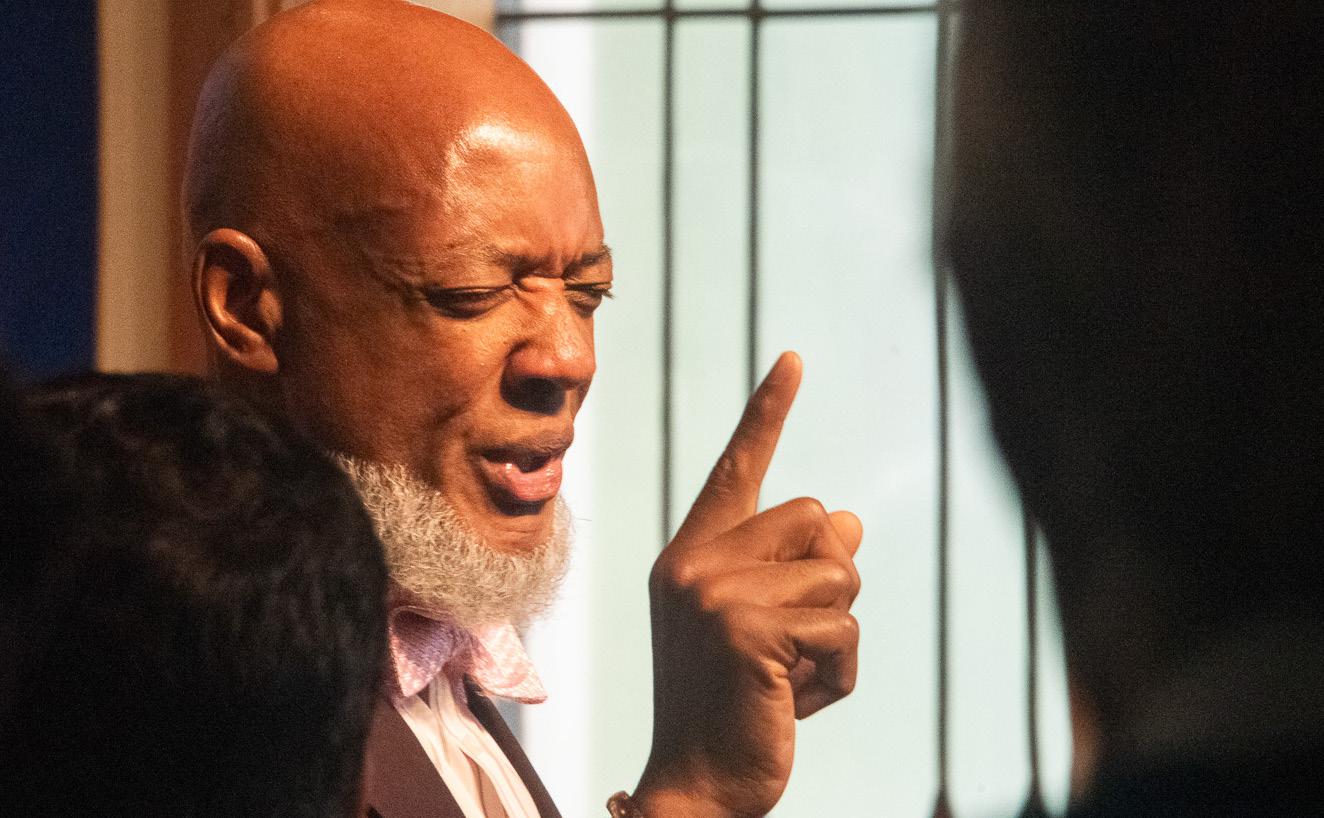

LIVING INTO OUR CORE VALUES OF COMMUNAL ENGAGEMENT AND COMPASSION: COLUMBIA CARES
FOR GREENVILLE, SC
Greenville, S.C. was one of the areas ravaged by Hurricane Helene, forcing organizations to take already stressed funding to use to address those emergency issues.
One of those organizations was United Ministries, which operates Place of Hope Shelter. With a Columbia Theological Seminary luncheon having to be rescheduled due to storm clean up in the area, the seminary decided instead to send a group of faculty, staff, students and administrators to South Carolina to help with clean up. Trustee Lesa Kastler joined the group as they cleaned and helped rejuvenate a building dedicated to helping unhoused members of the Greenville community, as well as one used to offer educational assistance to residents.
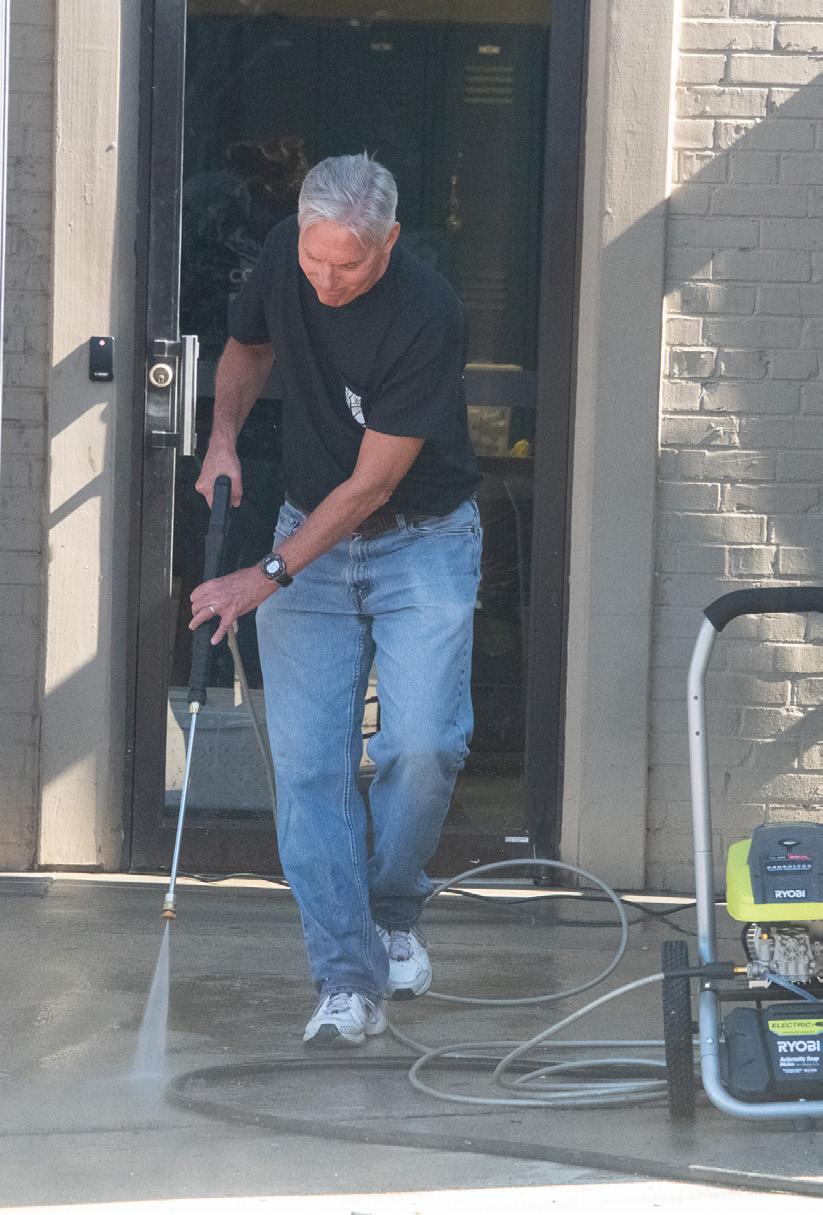


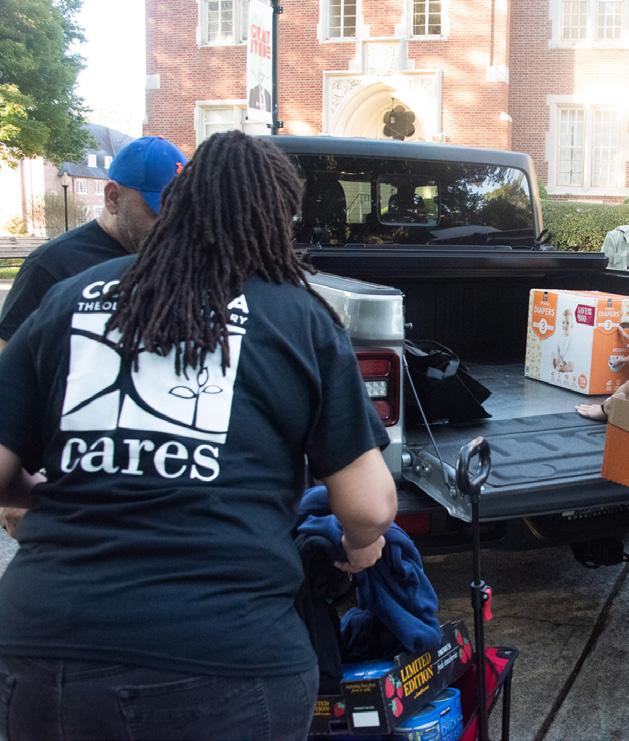


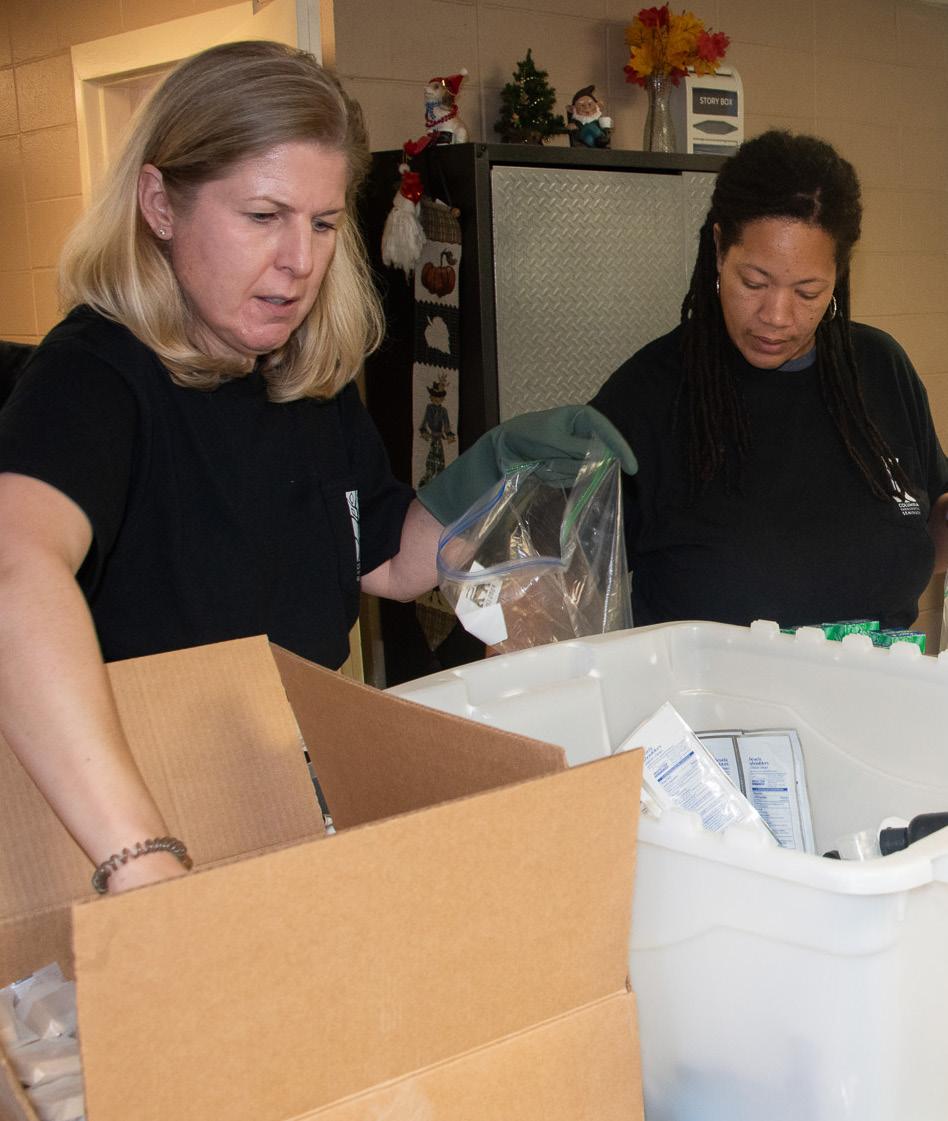

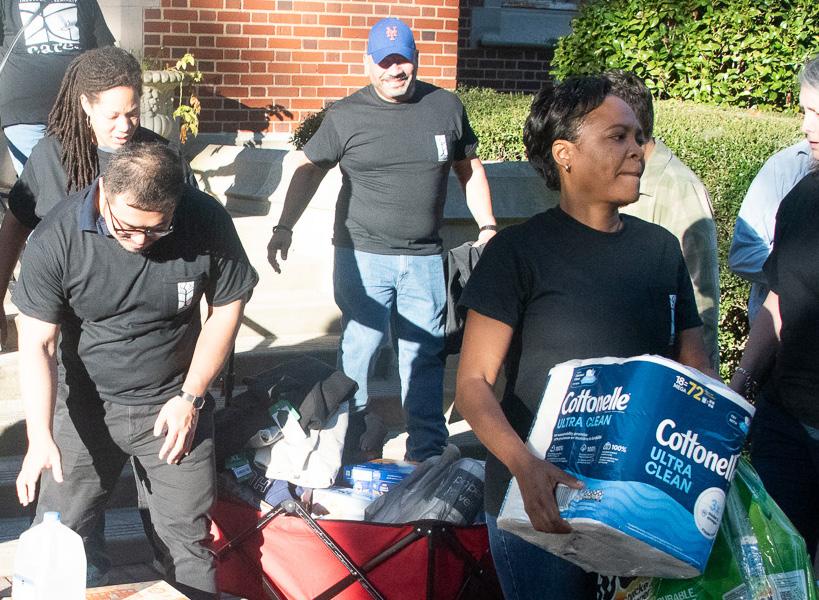
PROTECTING OUR INVESTMENT THROUGH LIFELONG LEARNING
BY ISRAEL GALINDO, ASSOCIATE DEAN FOR LIFELONG LEARNING
During a theological school or seminary consultation, I occasionally offer my elevator speech on the importance of lifelong learning for clergy. It goes something like this:
“You fret about the $160,000 to $170,000 it takes out of your endowment to graduate one MDiv, but in five years, half of them are out of ministry. What are you doing to protect your investment? That’s what lifelong learning is for, and why you need to offer it.”
Lifelong learning through professional continuing education programs is a universal practice in many professions, often required, but that is not generally the case for clergy.
Ministry is hard and just getting harder. Society and culture are continuously evolving, as are the complexities of people’s spiritual, emotional, and societal needs.
The challenges faced by congregations stress not only churches but their leaders.
In that environment, clergy must be lifelong learners, seeking to grow and adapt in their capacity to lead congregations and to minister in widely-ranging contexts.
Continuing Education is Valuable.
Lifelong learning helps clergy stay updated with contemporary theological thinking, societal issues, and pastoral best practices.
It aids in their ability to effectively address current societal and moral challenges, speaking to their congregation in a language and context that resonates with them.
The value of a dynamic and relevant ministry cannot be overstated.
It strengthens the bond between the clergy and their congregation, fostering a spiritual community that thrives on mutual growth and understanding.
Moreover, lifelong learning fosters personal growth.
It enables clergy to sustain their spiritual vitality, continually renewing their understanding and the renewal of their calling through the long arch of the ministerial vocational trajectory.
This personal growth directly translates into more impactful spiritual leadership.
The Center for Lifelong Learning at Columbia
Theological Seminary supports its alumni and church leaders across all denominations and faith traditions through its continuing education programs.
Through programs and courses, the Center provides opportunities for lay and ordained leaders to participate in communities of practice and address
the multiple challenges of congregational ministry and ministerial development.
The Center supports ministers experiencing vocational transition and forced termination through the Ministering to Ministers program.
And for those desiring a more sustained learning experience, the Leadership in Ministry and certificate programs in spirituality, spiritual direction, and older adult ministry provide participants with solid content and a meaningful community.
Seminaries are not just institutions for initial training; they should be hubs of continuous learning and resources.
By offering lifelong learning programs, seminaries can provide clergy with the necessary tools, knowledge, and community of practice to navigate the vocational arc of ministry.
They can promote intellectual and spiritual growth beyond the initial years of theological education, truly fulfilling their role as cradles of spiritual leadership and protecting their initial investment in training clergy for ministry.
Israel Galindo is Associate Dean for Lifelong Learning at Columbia Theological Seminary. He directs the Pastoral Excellence Programs of the Center for Lifelong Learning.
The Center for Lifelong Learning (CLL) at Columbia Theological Seminary offers exciting online and in-person opportunities, on and off campus, for participants to engage in classes, seminars, workshops, and other learning experiences.
Scan below to learn more about the Center for Lifelong Learning or visit www.ctsnet.edu/academics/ lifelong-learning/
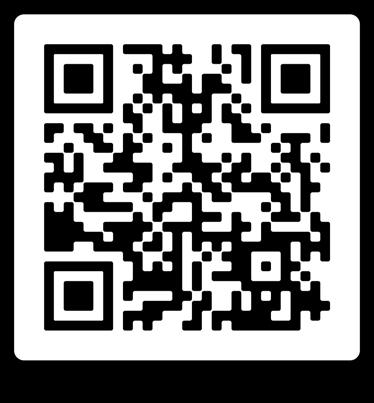

PREPARED FOR A COMMON CALLING
BY MASHAUN D. SIMON, DOCTOR OF MINISTRY ’25

One pastor serving two churches is not uncommon. One pastor serving two churches of different denominations is. Here’s how an agreement between the Presbyterian Church (USA) and the Evangelical Lutheran Church in America is helping sustain the future of the Church.
An average week for the Rev. Jin Kyung Ko goes a little like this: He spends his Mondays at St. Matthew’s Lutheran Church in Crafton, Penn. While there, he might take meetings, visit with members, and handle whatever else is necessary for
the day. The next day, Tuesday, his activities are pretty much the same — meetings, visitations, etc. — at Crafton United Presbyterian Church, which is roughly two minutes away.
Wednesdays and Thursdays repeat. One day at St. Matthew’s and the other at Crafton United. Fridays are a little different. Technically, Friday is his off day, which means he should be resting. Instead, however, he uses the day, as well as Saturday, for sermon preparation.

Sunday morning, he arrives at St. Matthew’s for their 9 a.m. worship service. As soon as he is done, he heads over to Crafton for their 11 a.m. service. This has been his routine since just before he was installed as pastor of both congregations, January 14, 2024. While a dual call may sound unique, it is not rare.
“Someone serving more than one church is pretty common in some areas, including the Minnesota area,” he said. “Especially in the ELCA. In some instances, a charge can serve two, sometimes three churches at one time.”
But a call like Ko’s to two different denominations is out of the ordinary. His call is part of the Formula of Agreement established in the 1990s between the Evangelical Lutheran Church in America, the Presbyterian Church (USA), the Reformed Church in America, and the United Church of Christ. The denominations entered something called full communion based on “A Common Calling,” according to the language in the agreement.
“Historically I have been part of the ELCA, but my background is Presbyterian, too,” he said. “My father is a Presbyterian pastor in Korea. He was a missionary in the Philippines for 20 years. That’s how I heard about Columbia.”
After attending and graduating from the Interdenominational Theological Center in Atlanta, Ko was looking to deepen his biblical studies, while also strengthening the practical approach to ministry. He had begun the ordination and confirmation process with the Lutheran Church around 2011, but he also felt the need to go deeper academically. Columbia Theological Seminary, he felt, made the most sense. He enrolled in the Master of Practical Theology (MAPT) degree program.
“I really wanted to do more study with the Bible. I really liked the Old Testament, because of my Lutheran affiliation,” he said. “But I chose to focus more on the New Testament mostly because preaching in the Lutheran Church is more gospel based.”
Professors like Dr. Mitzi Smith, Columbia’s J. Davison Philips Professor of New Testament; Dr. Kathy L. Dawson, the Benton Family Associate Professor of Christian Education; and Dr. Anna Carter Florence, the Peter Marshall Professor of Preaching, he said, are just a few of the professors that were impactful.
“I feel that, at that time, I lacked the practitioner stuff. I really wanted to study more,” he said. “The practical approach Columbia provides, as far as how to care for a congregation, how to educate people, etc., really helped.”
He remembers taking a narrative preaching course during his MAPT, which caused him to put himself in Jacob’s shoes. Prior to, he said, he would read the Bible and sometimes find himself agitated with the characters.
“It really helped me in understanding the characters of the Bible differently. That exercise gave me an idea of how to present these characters to congregants,” he said. “It is more than just preaching about them, but understanding them, which helps us understand ourselves better.”
The community aspect also made a difference. As students, he said, they were very tied to one another and supportive of each other’s endeavors and lives. He earned the MAPT degree in 2016. He returned for another degree, the Master of Arts in Theological Study, which he completed in 2021.
His call to Crafton and St. Matthew’s, he credits in part, to Columbia.
“My sermons,” he said, “I believe they called me because of my sermons – my preaching.”
And while things have been busy in the time he has been there, he is enjoying every bit of the experience.
“They love their church. There is a lot of history and a lot of tradition here in the community. It is very ecumenical, and they are committed to their community,” he said. “As a leader and a thinker, being here has stretched me, but also its affirmed me. Especially since English is my second language. It’s exciting and affirming.”
VIDEO GAMES AS A TOOL FOR ARCHIVAL RESEARCH
Staff from the C. Benton Kline, Jr. Special Collections & Archives prepared a study to examine whether video games can be used to teach archival research skills. The plan is to make the Columbia Archives and other archives more accessible to a broad range of users.
Historically, archival instruction has been mostly limited to explanations of policies and procedures—all important information and all lending itself well to traditional lectures or presentations.
The actual research process, however, has been largely left for new researchers to puzzle through on their own. Michael Robertson, Public Services Archivist at Columbia, discovered early in his archives career that the research process felt very much like a video game he had played in the past, demonstrating an unexpected use for “skill transference” between tasks and inspiring the Columbia Archives’ study.
While future Presbyterian ministers have a demonstrable need for archival skills since Presbyterians are known for their meticulous record-keeping, lessons learned from archival research have benefits for all seminarians and the general community alike. “Many
people use archives to check records or trace genealogy, but the skills involved are equally useful to biblical studies and theology,” said Michael.
Archival research skills, he said, include close attention to context, the ability to recontextualize materials as new information is found, and a level of comfort with uncertainty and ambiguity. Traditional lectures can point to these skills but can’t teach them well. Learning them works best with hands-on experience. Certain video games, he said, provide fun, self-paced opportunities to exercise these exact kinds of skills with low stakes for failure.
Columbia Archives staff presented the research concept to the Society of American Archivists and the Society of Georgia Archivists in 2023 to a positive reception.
FAITHFULLY ONWARD
The leaders of First Presbyterian Church of Decatur, Ala., had a tough decision to make in 2023.
The historic church, which had been filled with the city’s movers and shakers for 170 years, had come to a difficult point in its history.
“We got old,” said John Eddington, a member of the church for 13 years after moving to the Birmingham suburb. “I’m 67 and I am considered the youth group,” he said with a chuckle.
“We just didn’t have young people,” said the Rev. Peggy McClure who was the church’s interim pastor. “There’s just so much energy you can keep producing to keep having a strong effect.”
“Just a solid, good group of people, but you know we got old and tired and just couldn’t carry the burden any more of trying to grow the church,” Eddington added. “There was a time for us to go ahead and make that decision, ‘Okay let’s go ahead and close it.’”
So, with a Christmas Eve 2022 service turning into their final service, church leaders decided to close the church in early 2023.

Unlike many churches who fold, First Presbyterian Church was on strong financial footing. That presented church leaders an opportunity for FPC to continue its cherished legacy of doing what McClure and Eddington being able to keep spreading God’s love.
“There were just lots of ways that the church gave over the years and when you looked at the budget every year, you know the missions portion of that budget was usually a pretty good size number,” Eddington said. “So the church has long history of giving.”
Church leaders decided to make sure the remaining church funds went to various entities such as a Presbyterian camp in north Alabama, the Alabama Center for the Arts, a dental lab for a free community clinic, and a Presbyterian children’s home pavilion for older teens.
And with McClure being a 2012 graduate of Columbia Theological Seminary, she suggested a gift to the seminary. McClure, a lawyer, earned

How one church’s legacy lives through the new fund for excellence at Columbia Theological Semina ry
her Masters of Divinity degree from Columbia, along with a certificate in spiritual formation. Her calling to ministry came after her son died in an automobile accident and later, her husband’s passing.
“After he passed away, I was going through some of his publications and saw this ad about Columbia,” she said. “I went, ‘it was so clear this is what you’re supposed to do, where you’re supposed to do it, and when.’ I was still practicing law at the time. But that’s what I did. I told the general counsel that I was going to seminary even though I hadn’t applied yet.”
“And one of our parishioners, Dr. Rob Sparks, is also a graduate of Columbia so we had both home-grown talent, and we’ll call Peggy incoming talent, that came through Columbia,” Eddington added. “So, certainly there was a desire for us to make sure Columbia continues to be able to offer its mission.”
With a final, generous gift of $25,000 to Columbia, the church established the First Presbyterian Church of Decatur, Alabama Fund for Excellence.
The Fund for Excellence is a permanent endowment fund designed to support initiatives at Columbia that foster, build, and equip excellence in ministry.
Funds for Excellence yield resources for the greatest unmet priority needs of the seminary’s mission. These perpetual funds are intentionally flexible to address priorities that emerge from age to age in response to evolving needs, best practices, and unforeseen opportunities.
So though a Methodist church now holds service inside the former FPC building, the First Presbyterian Church, Decatur, Ala., legacy will live on through the works of all the organizations that the church has given to, including Columbia Theological Seminary.
“In one way, it’s heartbreaking because you hate to have something that you’ve been around so long not be here,” Eddington said. “But at the same time, we were blessed, and I think everybody thought it was important that we share that blessing. But the only thing that is permanent is God’s love for us. To be able to spread that a little bit is a blessing that we all felt very good about.”
McClure added, “It was a warm, inviting church. It really was the highlight of my ministry. I think it made it easier to close knowing we were helping others.”
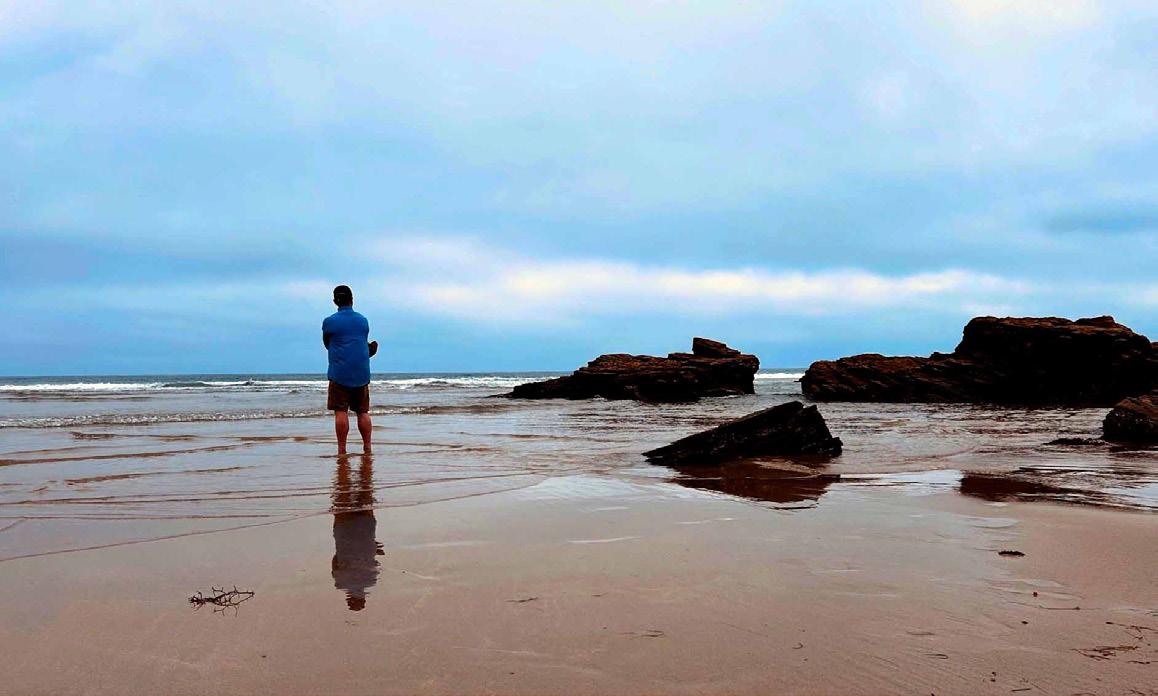
WALKING MEDITATION: TRAVELING THE PATH TO WELLNESS AND RESILIENCE
BY DR. JAKE MYERS, WADE P. HUIE, JR. ASSOCIATE PROFESSOR OF HOMILETICS


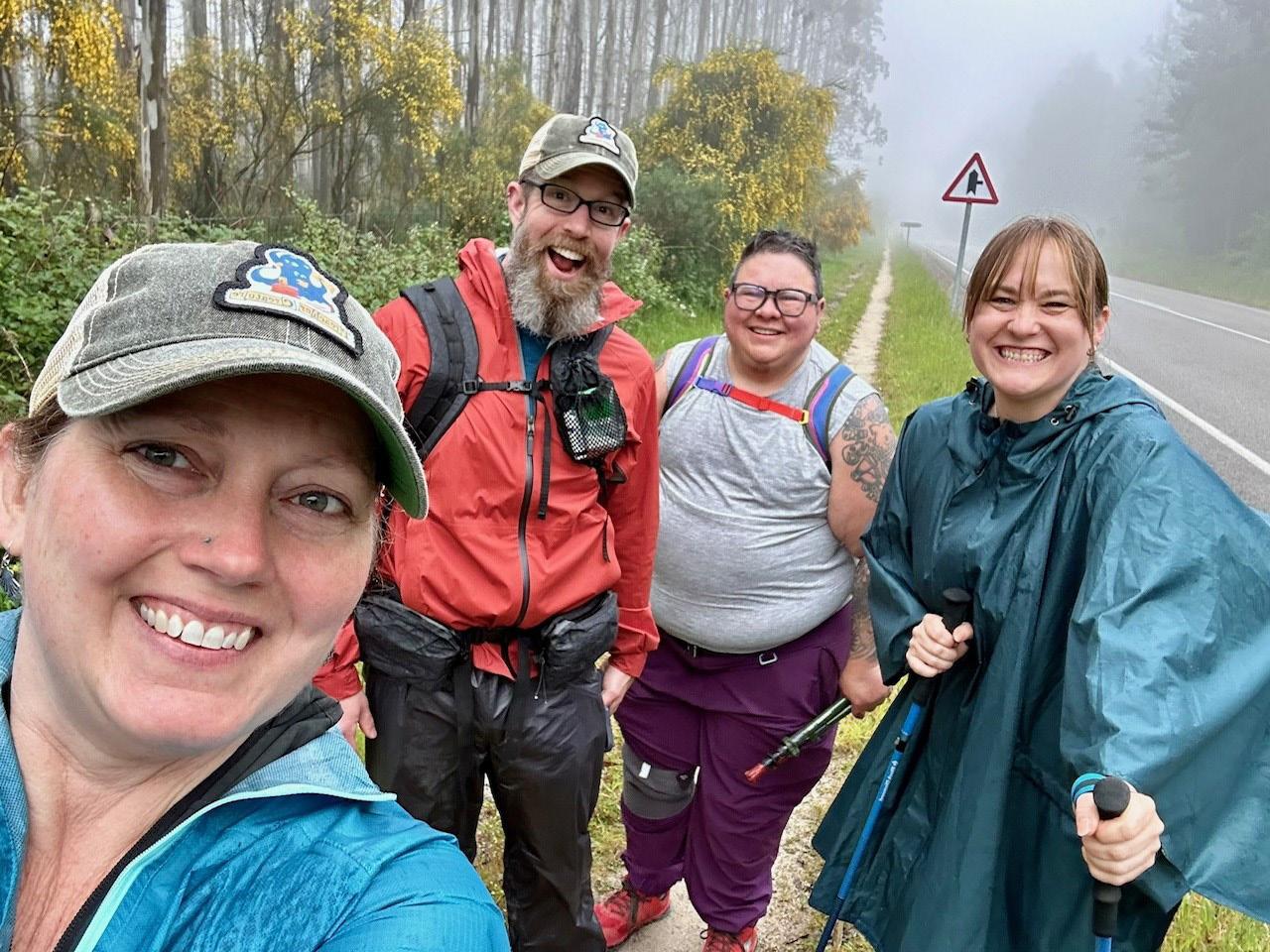
Solvitur ambulando. It is solved by walking. This phrase is often attributed to Saint Augustine, but it is much older. The idea is that walking, especially mindful and intentional walking, strengthens the connections between one’s mind, body, and spirit and can lead to new ways of seeing ourself and our world. The Columbia Preachers Studio for Renewal’s (CPSR) program for clergy wellness and
resilience returned from their inaugural event in June 2024. Holy Encounters: Preachers on Pilgrimage was a 2-week spiritual pilgrimage on the Camino de Santiago.
Led by Dr. Abby Myers, psychologist and Dr. Jake Myers, Columbia’s Wade P. Huie, Jr. Associate Professor of Homiletics, 15 preachers from all over the United States hiked over 150 miles along the northern coast of Spain.

Their journey began with a service of blessing and communion on the beach and ended with a pilgrims’ mass in the Cathedral of Santiago de Compostela. Preachers began each morning listening to a recorded meditation and devotion as they walked and ended each day with yoga practices to care for their spirit and body. The preachers shared stories, stressors, and celebrations in their families and ministries as they walked with each other. Other days they walked in silence, providing opportunities of quiet to sit with their own thoughts and ideas, to pray, and to meditate on the beauty of God’s creation. Each night at dinner, the group participated in a time of processing their experiences and what they learned about themselves, each other, and God.
Through shared meals, muddy paths, aching feet, and mountain top vistas of the turquoise ocean, the preachers journeyed towards more than a physical destination. They journeyed towards greater self-awareness, stronger social connections, and more meaningful spiritual practices to build their resilience and care for their entire being-mind, body, and spirit.
“The Camino provides,” is a refrain heard over and over along the ancient route. While each
preacher needed something unique from this experience, several shared the desire to engage their daily life at a pace of 3 miles per hour (the average walking pace). The rhythms of waking up, packing a bag, and setting out on the path for the day’s journey provided a clear purpose. The drive and determination of people called to serve God and love their neighbors was no less here than in day-to-day life. However, the practice of walking with presence the presence of self, presence in community, presence with nature, and presence of God was a contrast with the often hectic and stressful days of a preacher. Several participants vowed to engage their vocation with the same drive and determination to serve as they always have, but the Camino provided an embodied experience of how to do so at a slower, more intentional pace that enhances resilience.
The CPSR was created in 2023 under the co-direction of Drs. Anna Carter Florence and Jake Myers. The CPSR received a 5-year, $1.25 million grant from the Lilly Endowment, Inc.’s Compelling Preaching initiative. The mission of the CPSR is to cultivate practices, provide resources, and facilitate holy encounters to help preachers proclaim the gospel in postmodern contexts in more compelling, effective, and faithful ways. The CPSR program is designed to encourage holy encounters with scripture, society, and self, including:
• Quarterly preaching workshops designed to foster more faithful, creative, and transformative engagement with scripture;
• Online homiletical resources and educational opportunities curated in response to preachers’ expressed needs; and
• Facilitated experiences of renewal to foster preachers’ selfhood and resilience.
To learn more about CPSR, visit: www.ctsnet.edu/ academics/preachers-studio-for-renewal/
JACKSON NII SABAAH ADAMAH
APPOINTED
ASSISTANT PROFESSOR OF WORLD CHRISTIANITIES
The Columbia Theological Seminary Board of Trustees has appointed Jackson Nii Sabaah Adamah as the Seminary’s new Assistant Professor of World Christianities, effective July 1, 2025.
An expert in African Christian Theology, Moral and Political Theology, Economic Theology, Ecotheology, Black Atlantic Studies, and World Christianities, Adamah is completing his Doctor of Theology degree at Duke University, where he also earned a Master of Theology degree.
“I am honored and thrilled to join the CTS family and contribute to its vision of nurturing the next generation of pastoral leaders for the Church and the world,” Adamah said. “I deeply relish the chance to collaborate with the students and faculty of CTS as we navigate the complexities of faithfulness to the gospel in these challenging times.”
“I am delighted to extend my heartfelt gratitude to the faculty search committee for their exceptional discernment in selecting Jackson Nii Sabaah Adamah as our new Assistant Professor of World Christianities,” added the Rev. Dr. Victor Aloyo Jr., president of Columbia Theological Seminary. “We couldn’t be more excited to welcome Jackson to our esteemed faculty at Columbia. His deep expertise, innovative research, and infectious passion for teaching are sure to elevate our mission of creating transformational experiences and unlocking incredible opportunities for our students.”
Adamah is a graduate of Kwame Nkrumah University of Science and Technology in Kumasi, Ghana, where he earned a degree in geomatic

engineering. He also has a Master of Divinity degree from Campbell University in North Carolina.
Among the many gifts that Adamah brings to Columbia is his interdisciplinary breadth. He has taught courses in New Testament Studies, Ancient and Medieval Theology and Philosophy, Christian Theology, Christian Ethics, and Christian Education. Adamah has also received a Doctor of Theology Fellowship at the Duke Divinity School’s Center for Reconciliation, the Kenan Institute for Ethics Graduate Fellowship at Duke University, the T.B. Mason Scholarship in the Study of Christian Ethics, and the Cooperative Baptist Fellowship of North Carolina Scholarship for Baptist Doctoral Students.
“The appointment of Jackson Nii Sabaah Adamah is exciting for so many reasons,” said Columbia Christine Roy Yoder, Senior Vice President, Dean of Faculty and Academic Affairs. “He is a remarkable scholar, skilled interdisciplinary thinker, gifted teacher, and generous colleague who is deeply committed to theological education for the sake of the Church and the world. A scholar with a pastor’s heart, he will lead us in new directions and build on Columbia’s distinguished history of faculty who shape the field of World Christianities. I look forward to serving with and learning from Jackson for many years to come.”

BOARD CHAIR TRANSITION
Jane Fahey, MDiv ’01, after faithfully serving two terms as board chair of the Columbia Board of Trusteeshas stepped down. Fahey is the former Interim Executive Presbyter for the Presbytery of Greater Atlanta, Attorney, and a Civic Leader.
Filling the chair position is Elizabeth Goodrich, MDiv ’03, owner of Thank You Books, and Minister-at-Large in the Presbytery of Sheppards and Lapsley in Birmingham, Alabama.
The Columbia campus community looks forward to welcoming Elizabeth and the rest of the Board of Trustees to campus for their fall meeting on October 6 and 7.


See our latest videos at https://www.youtube.com/@ ctsmedia/videos

THE DAILY PRACTICE OF CENTERING PRAYER
BY DR. HELEN BLIER, DIRECTOR OF LIFELONG LEARNING AT THE CENTER FOR LIFELONG LEARNING
The arc of a life is marked by watershed moments – those defining times that clearly demarcate a before and an after.
I remember March 2020 like it was yesterday.
I’d been told by my daughter’s school that she’d have an extra week of spring break so that teachers could have time to transfer their classroom teaching online.
I asked my close friend, a bioethicist working at the local university, how long she thought “this” would go on – “this” meaning the powering down of public life due to this Novel Coronavirus thing.
“Two years,” she said.
I stared at her slack-jawed.
“Minimum,” she added
I reeled; two years? There was no way we’d get through two years of lockdown and isolation. How would the collective get through it? How would I?
I knew I needed to lash myself to something stronger and deeper than this unprecedented disruption, something that would ground and feed me both. I had my work cut out for me as a parent, as a program director, and as a human being who cared about other folks.
What to do?
That was when I began my daily practice of centering prayer – not because of some inner yearning to deepen my spiritual journey, but out of desperation and a strong survival instinct. After all, what could be bigger to lash myself to than God?
I began my centering prayer practice modestly – just 15 minutes a day, first thing in the morning after making the coffee (always coffee). I sat in a chair next to my picture window, cued up the app I downloaded from Contemplative Outreach, and hit start.
The opening gong chimed.
Not going to lie – when the closing gong sounded 15 minutes later, I didn’t feel any different. No epiphanies, no ethereal calm. Just 15 minutes older.
So I tried it again the next day. And the one after that.
It was a practice born likely out of equal parts stubbornness, desperation, and hope that it would provide some modicum of sanity in the midst of the crazy that was the early pandemic. It took nearly a month, but I began to notice an internal shift.
Gradually, I’d worked up to 30 minutes every morning – first thing, after coffee (of course).
Gradually, it moved from something I made myself do to something I needed to do.
It became as essential a part of my morning routine as that coffee.
Occasionally, I’d skip a morning because I wanted to sleep in a bit or had another early commitment.
I felt unsettled for the rest of the day, with a nagging sense of something missing.
If I skipped for more than a day, I got downright grumpy.
My daily baseline had changed, and the practice had worked on me as I had worked on it, becoming “like oil in my bones,” as a friend described it.
I found that shift remarkable.
The practice was so simple – nothing more sophisticated than a cup of coffee, a free app, and half an hour of intentional sitting.
No mantras, no movement – just a visualization that helped me remind my mind’s eye that this time was different and that I would be spending it with God.
Sometimes, God and I would talk. Mostly, we’d just sit.
Four-plus years later, I still engage in this practice every morning. And I still get grumpy if I’m traveling or working and skip for a few days.
I credit it with keeping me anchored and functioning during the pandemic and in the non-Covid tumult I experienced during the time since.
I’ve received so many gifts from the practice, too. I’ve found clarity and peace, gifts that helped with discernment.
Mind you, centering prayer isn’t the answer to all of life’s problems, especially those that require professional support or intervention.
What it does do, however – what all practices do – is provide a different baseline from which that other important work can happen. It doesn’t change the world, but it changed my engagement with it.
For me, it gave me a bigger horizon against which to navigate the impossibly ginormous challenge of a global pandemic.
It was a daily reminder of the abiding and compassionate presence of the divine, a presence that ran deeper and more reliably than something as big as a virus that shut down the world.
I committed to showing up daily. And it’s not so much that God showed up, too – it’s that I realized that God was there all along.
I continue it today because I still need that reminder. Furthermore, I’ve learned the company is pretty great.
Dr. Helen Blier is the Director of Lifelong Learning at the Center for Lifelong Learning. She is deeply knowledgeable about lifelong learning for ministers, church leaders, and theologically curious laity, having served in the field for over ten years.
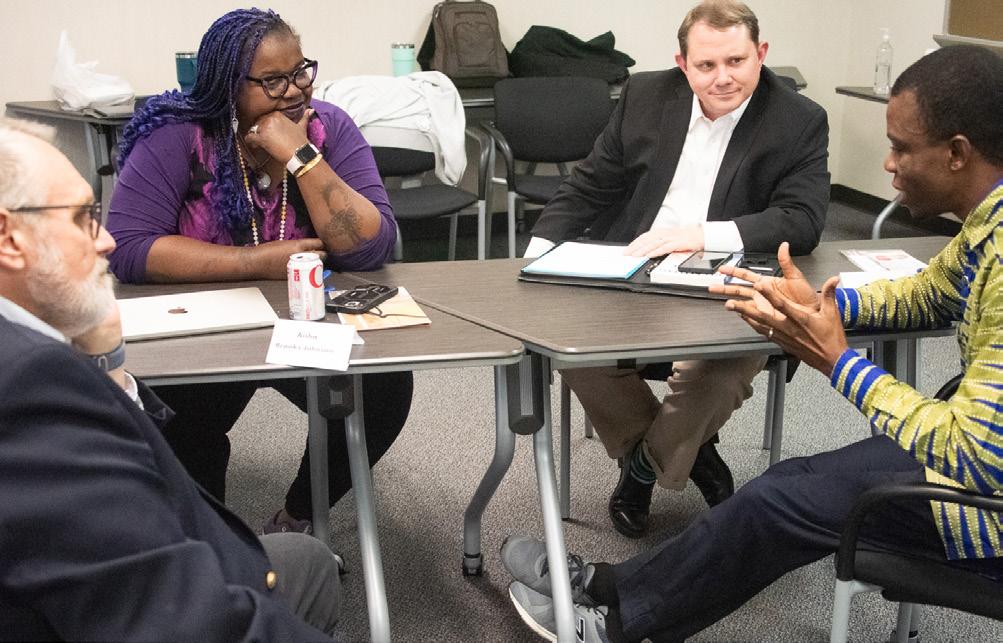

MID COUNCIL PARTNERS DISCUSS FUTURE NEEDS OF CHURCH
Church leaders from around the southeast met on Columbia’s campus in February 2025 to discuss ways the seminary can meet prepare future pastors to best serve their ministries. The networking event featured listening and learning opportunities and discussions with current students.

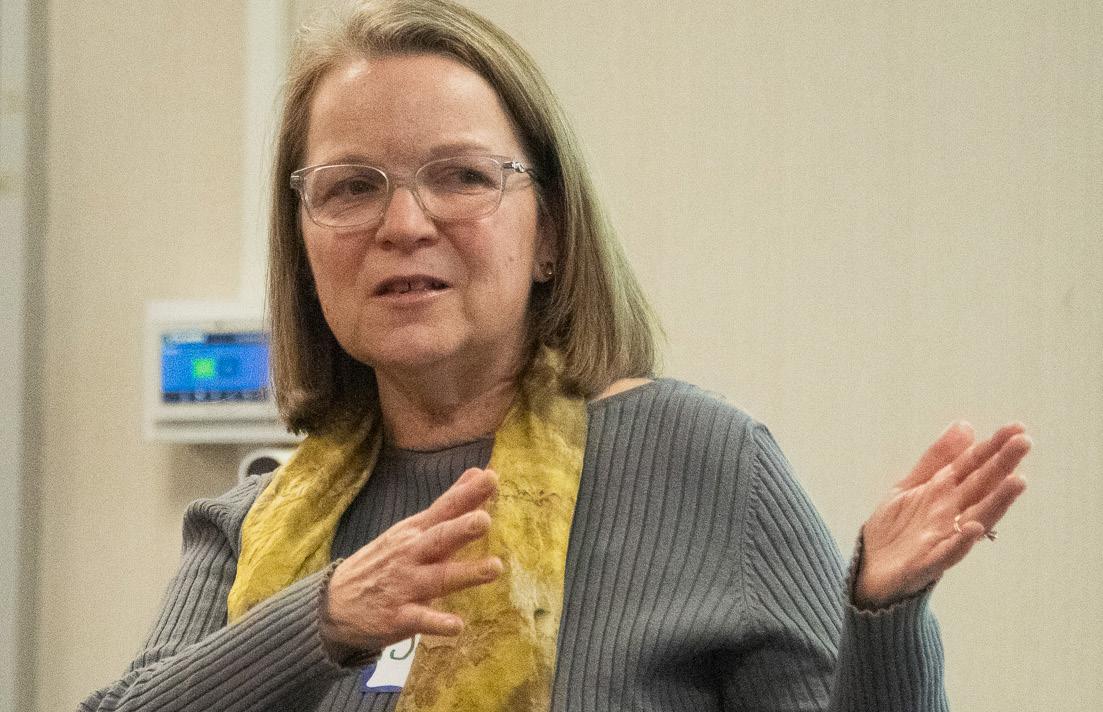


FACULTY MILESTONES
Columbia Theological Seminary emphasizes its role as a “teaching institution,” a commitment deeply interconnected with scholarly activity. This scholarly activity encompasses three main components: research, scholarship, and creative endeavor, all of which are essential to the university’s academic programs and are conducted by individual faculty members.
These scholarly pursuits are crucial to Columbia
Theological Seminary’s mission and play a significant role in enhancing the student learning experience. The faculty’s dedication to academic excellence and ministry formation contributes greatly to the institution’s reputation. As a theological institution, Columbia Theological Seminary recognizes and celebrates the achievements and milestones of its faculty members, who exemplify scholarly rigor and innovation.
Over the past year, notable accomplishments have included published books, the development of grant-funded programs, written articles, participation in national conferences, and significant academic milestones. For more information, please visit our faculty page at CTSnet.edu.
WABASH CENTER TO HOUSE ARCHIVES AT COLUMBIA
Continuing a long professional connection, Columbia Theological Seminary became the home of the archival collection of the Wabash Center for Teaching and Learning in Theology and Religion.
Founded in 1996, the Wabash Center was established in Crawfordsville, Indiana, at Wabash College to enhance the teaching of religious and theological studies in higher education. The Wabash Center fulfills this mission by creating and curating educational resources, administering a regranting program, and convening cohort groups.
Over the decades, the Wabash Center has provided a space for Columbia faculty to connect the classroom to the world. These opportunities support faculty’s pedagogical development, scholarly engagement, and service to the Seminary, Church, and community.
CTS President Victor Aloyo, Jr. remarked, “Columbia’s relationship with the Wabash Center has been an immense gift to our institution, especially our faculty. As we continue our forward-looking trajectory in pursuit of our mission and vision, we are delighted to be taking this next step in partnership with Wabash”.
“The Wabash Center has been fulfilling its mission at Wabash College for nearly 30 years by providing resources and support that enhances teaching and learning at colleges, seminaries, and theological schools around the world,” said Wabash College President Scott E. Feller. “We are grateful that the seminary will provide archival assistance that will preserve the Wabash Center’s history and provide digital access that will allow others to benefit from this important work.”
The Wabash Center archives include materials that document faculty practices and vocation, theological educational environments, and teaching and learning resources.
“The history of the Wabash Center encompasses many aspects of the story of theological education. We are elated to partner with Columbia to preserve our story and to make our materials accessible for research,” said Wabash Center Director Nancy Lynne Westfield. “Along with record retention and archiving, in the coming years, we are planning to develop programs to assist religion and theology faculty with learning the skills of archiving to create more dynamic courses and more innovative curriculum.”

COLUMBIA IN THE CHURCH IN THE WORLD
The warm hospitality extended by our colleagues at the Malabar Mar Thoma Syrian Christian Evangelistic Association in welcoming the delegation from Columbia Theological Seminary this past February was exceptional. Drs. Martha Moore-Keish and Raj Nadella joined President Aloyo on this trip to Kerala, India, to participate in the 130th anniversary of the Maramon Convention. During the event, Dr. Aloyo proclaimed the Gospel of Christ three times to over 25,000 attendees at each worship service, underscoring the strong partnerships that have developed with the Mar Thoma Church over the years. Columbia Seminary is grateful for the leadership of Bishop Dr. Isaac Mar Philoxenos, who initiated this invitation.




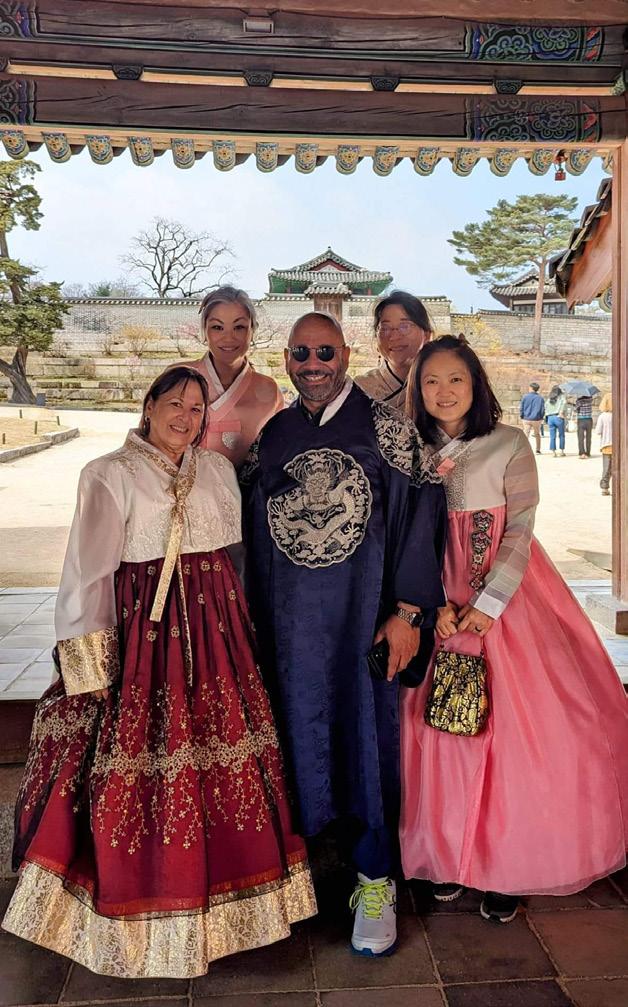
Trips to South Korea, Japan, and Taiwan to strengthen existing ecclesial and other relationships, but also to forge new global educational partnerships—facilitated by Dr. Sue Kim Park, Dr. Christine Hong, and Dr. Christine Roy Yoder—enable resource-sharing across institutions of higher education, and a trip to Puerto Rico yielded a new partnership with the InterAmerican University that will increase contextual education opportunities for our students.



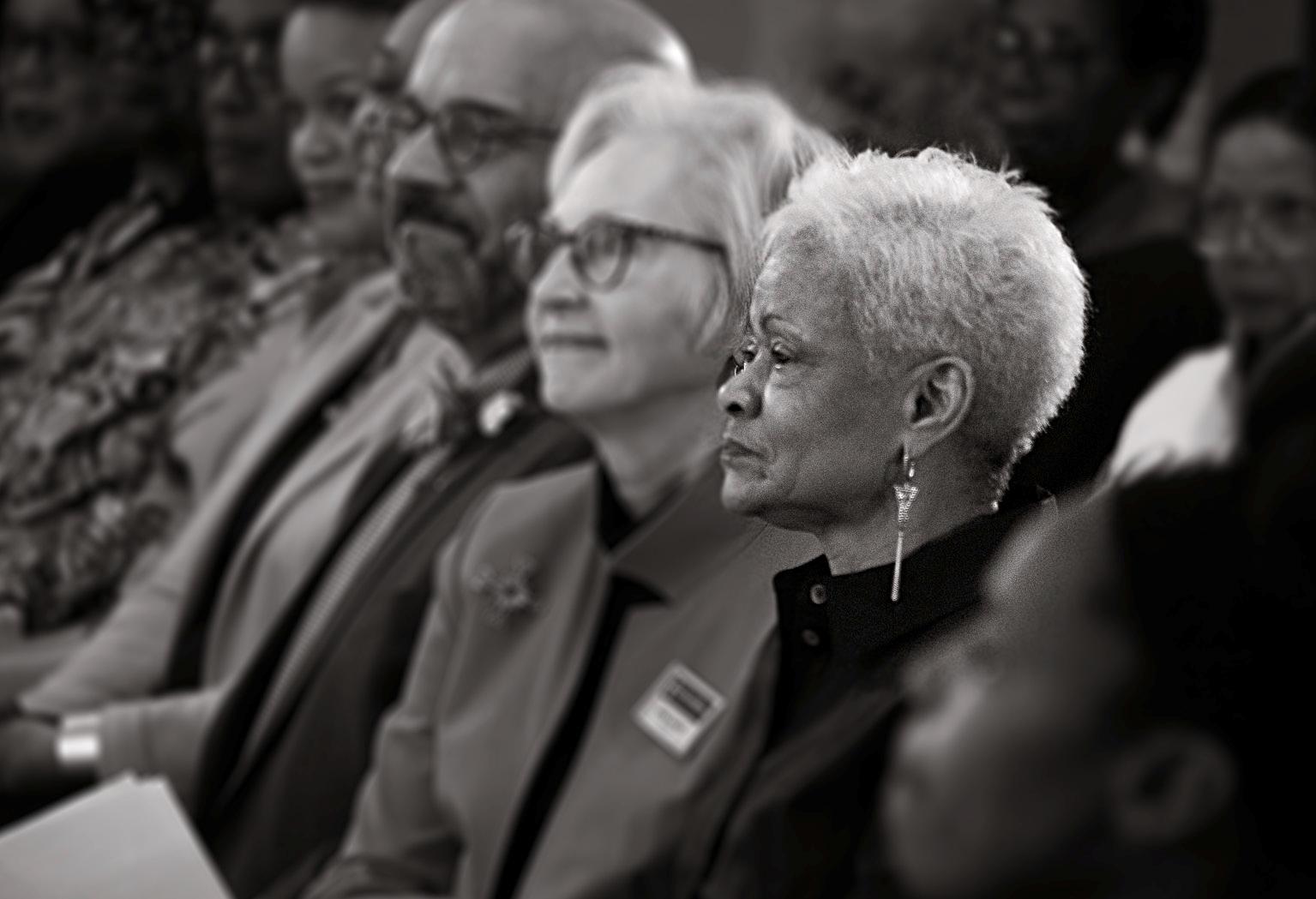

| LANTERN: THE YEAR IN REVIEW SUMMER ’25

COLUMBIA INAUGURATES REV. DR. MITZI J. SMITH AS THE J. DAVISON PHILIPS PROFESSOR
OF NEW TESTAMENT
BY SAFIYYAH ABDULLAH MDIV/MAPT ’28
On Wednesday, March 19, 2025, Columbia Theological Seminary celebrated the inauguration of the Rev. Dr. Mitzi J. Smith as the J. Davison Philips Professor of New Testament. The ceremony took place in Harrington Chapel, bringing together esteemed colleagues, students, and guests from Decatur, Georgia and across the country.
The ceremony was filled with words of celebration, including from Dr. Christine Roy Yoder, Senior Vice President and Dean of Faculty, who praised Dr. Smith’s profound contributions to the Columbia community and beyond: “She is a trailblazer, justice seeker, truth-teller, and survivor—a survivor whose work and witness challenge and motivate us all.”
As part of her inauguration, Dr. Smith delivered a lecture titled Rereading Luke’s Slave Parables through the Eyes of a Freedman, in which she examined the Gospel of Luke’s portrayal of Jesus as the son of Mary, a doulē (slave woman). Luke 4:16-19 served as the focal text for her exploration.
Dr. Smith’s vows were administered by Dr. Jane Fahey ’01, Chair of the Board of Trustees, and Columbia Theological Seminary President, the Rev. Dr. Victor Aloyo Jr.
Her inauguration acknowledges her dedication to biblical scholarship, pedagogy and prophetic proclamation.

ALUMNI REUNION ’25
Alumni gathered in February for Reclaiming the Call to be the One Church, featuring keynote lecture by alumnus, the Most Reverend Dr. Maake Masango ’87. Dr. Masango is emeritus Professor of Pastoral Care and Counseling at the University of Pretoria in South Africa. He is a retired Presbyterian Pastor, former moderator of the Presbyterian Church of Southern Africa, and former member of the World Council of Churches.


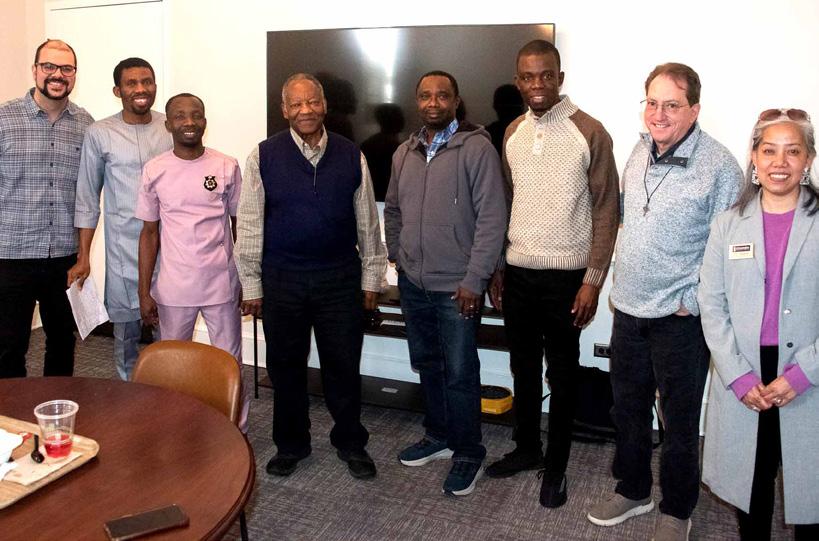








In addition to the keynote lecture, a panel titled “Every Tongue, Every Nation: Christianity in the Global Context” and workshop offerings led by Columbia faculty and staff were offered to the more than 70 alums who returned to the campus. As in years past, the event provided plenty of time for connection, reconnection, and fellowship.
MATT CONNER PIONEER IN MINISTRY AWARD
Matt Conner MDiv ’17, is the recipient of this year’s Pioneer in Ministry Award. He was nominated by The Rev. Pendleton Peery ’03 and ’15, for “the ways Matt has embraced ministry beyond pastoral ministry and in different vocations.”
“I’ve seen him embrace a breadth of what it means to do ministry in this day and age, ministry in a congregation, ministry that helps congregations participatein the important needs of the city in our case affordable houseing,” says Pen in his nominating video. He continues, “ He inspires, motivates, and encourages his colleagues, including me, to also reach for that kind of breadth in the way we understand the ministry to which Christ calls us.”
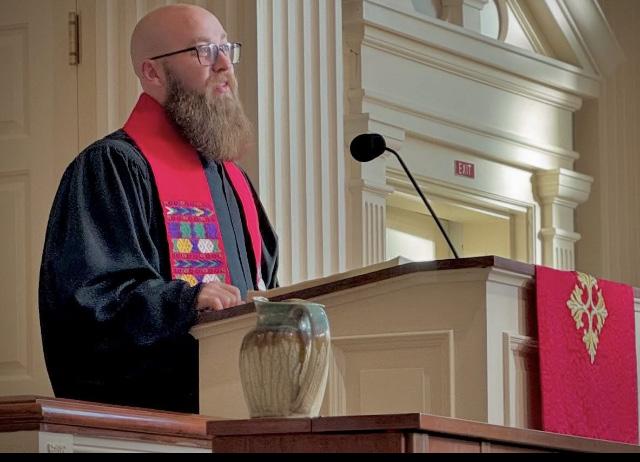



DR. PAIGE MAXWELL MCRIGHT
DISTINGUISHED SERVICE AWARD
Dr. Paige Maxwell McRight ’02 received her DMin while serving the Presbytery in Charlotte, North Carolina. She has faithfully served in different roles throughout the southeast. She was the first female candidate for ordination in the history of the North Alabama Presbytery.
According to her nominator, Rev. Dr. Mark Verdery, ’71, “Paige has played a major role throughout her ministry in the revising and the reforming of the Presbyterian Church’s polity. She has served on three General Assembly task forces to revise different sections of our Book of Order.”
For more information on ways to get involved with Columbia and other alums, visit www.ctsnet.edu/alurni
CALL TO JUSTICE ADVOCACY TRAINING DAYS
“Once you have a relationship with Jesus, everything about you is different, and therefore you are called to understand that as people who are followers of Jesus Christ, justice advocacy is one of his primary calls,” Rev Jimmie Hawkins said in his opening speech for “A Call To Justice.”
Columbia Theological Seminary joined several local and national organizations to host a two-day event “A Call To Justice” advocacy training workshop on March 6-7 to train and inform college students and advocates on how to effectively be part of change and support in important issues of the day.
The event was a collaborative venture by Columbia students, staff, and faculty, and the Washington, D.C.-based Presbyterian Church (USA) Office of Public Witness and Advocacy, Self-Development of People in the Presbyterian Mission Agency, Presbyterians for a Better Georgia, Faith in Public Life (Georgia), Georgia Interfaith Public Policy Center, Georgia Interfaith Power and Light, Hosanna Project, and Columbia Presbyterian Church.
The groups conducted workshops and lectures about ways to effectively advocate for change and improvement in issues such as affordable housing, poverty and justice, immigration and refugee justice, environmental justice, along with awareness of the latest legislation pending locally and in Washington, D.C.

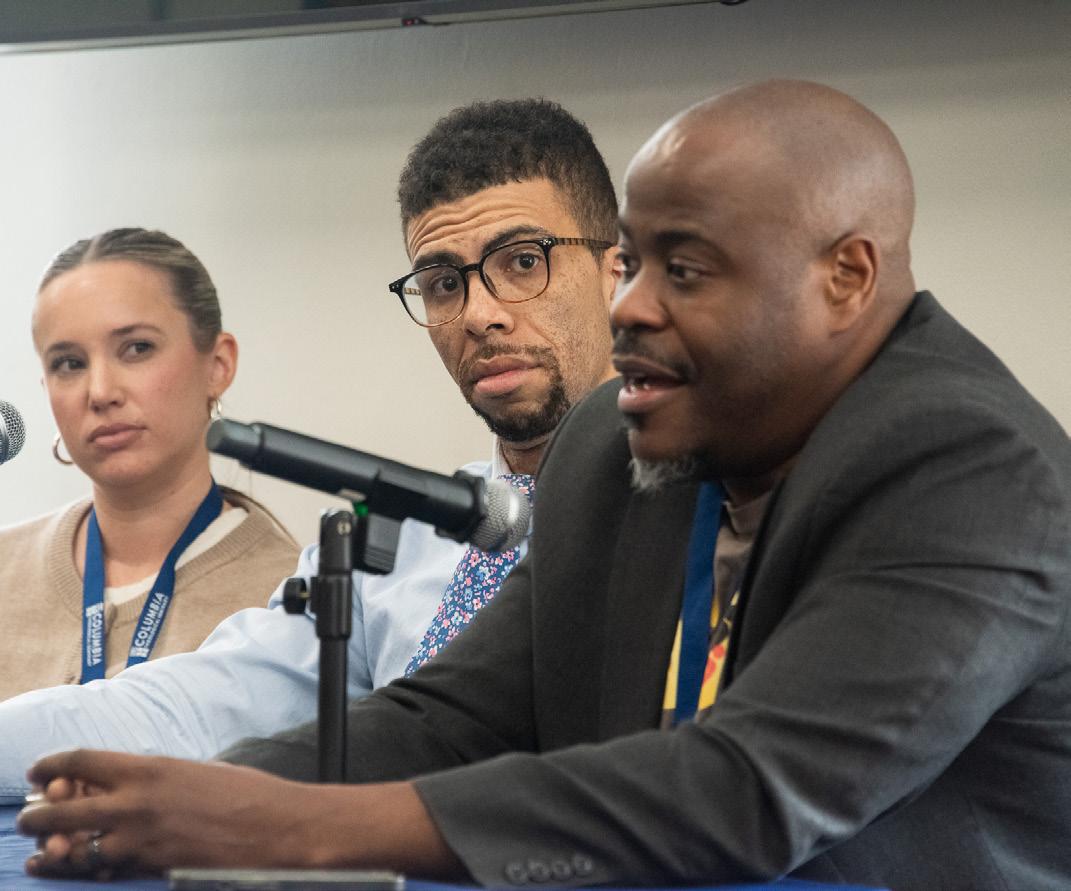
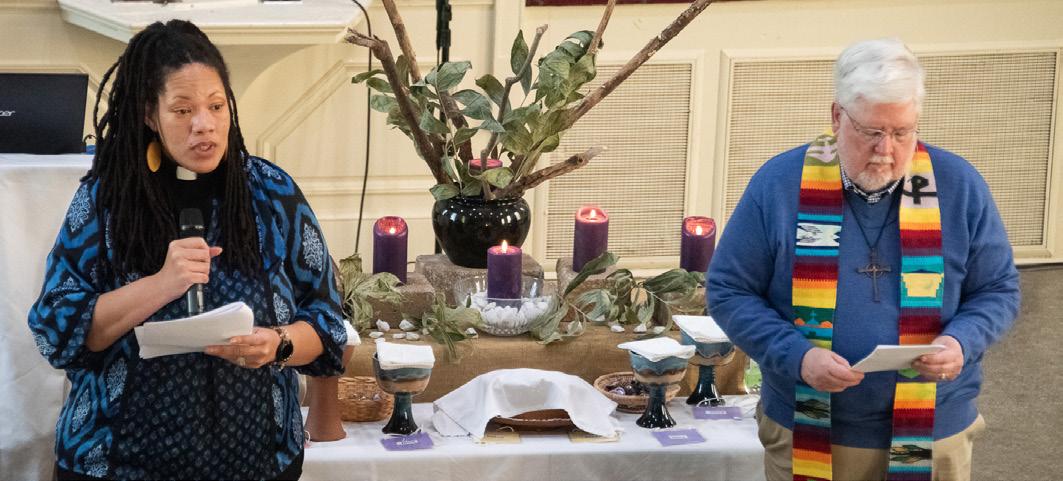

PACIFIC, ASIAN, AND NORTH AMERICAN ASIAN WOMEN IN THEOLOGY (PANAAWTM) CONFERENCE
On March 25, PANAAWTM met for its 40th-anniversary celebration on Columbia’s campus for “Simmering Stories, Weaving Wisdom: Traditioning PANAAWTM into the Futures.”
The theme for this gathering highlighted storytelling as a vital means of passing down wisdom across generations, with an aim to honor their evolution—from a gathering of support into a source of belonging and empowerment—celebrating collective flourishing. Through storytelling, arts, and shared histories, participants “stitched together” past narratives while envisioning a thriving future for PANAAWTM, honoring both their embodied practices and interracial solidarity.





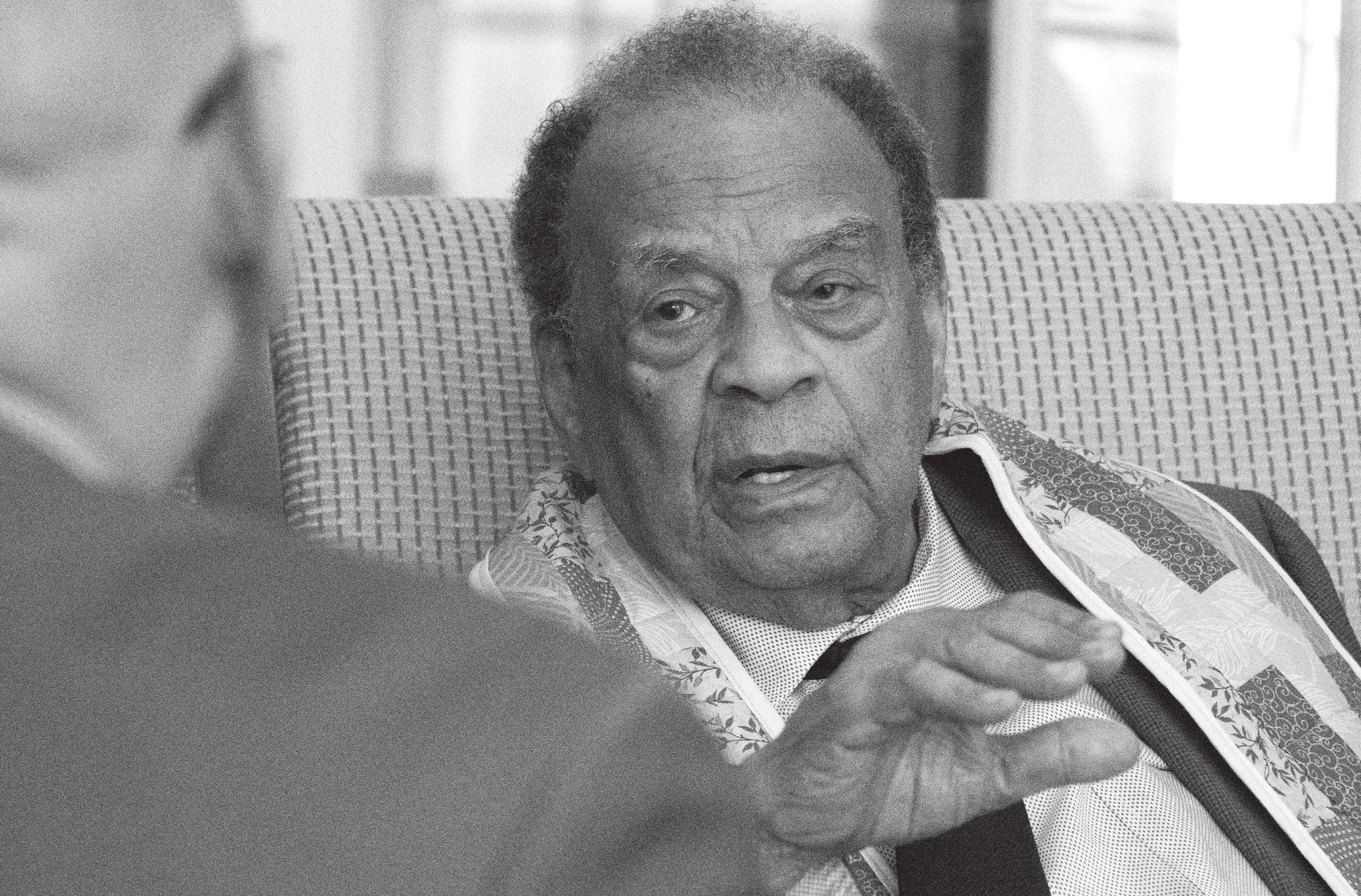
COLUMBIA
WELCOMES
AMBASSADOR REV. ANDREW YOUNG FOR A DAY OF REFLECTION AND DIALOGUE.
BY SAFIYYAH ABDULLAH MDIV/MAPT ’28
The Rev. Andrew J. Young sat on stage in front of Columbia’s students, faculty, administrators and staff and recalled a run he once took as a young man in Kings Mountain, N.C.
Tired, but deciding to push on, he recalled reaching the summit and looking out over the landscape. He remembered a radiant blue sky and trees that seemed to have sparkles in them.
40 | LANTERN: THE YEAR IN REVIEW
“It hit me there, ‘Damn! Everything I see has got a purpose,’” Young said. “And they are doing what they are supposed to be doing. And that’s why the world is so beautiful. I ain’t got no purpose, but surely whoever made all of this and made everything else with a purpose, didn’t make me with no purpose at all. So, I said ‘I don’t know what it is, and I don’t care what it is. But that one day at a time, if there’s something nobody else wants to do, maybe I’ll try it and that’s the way I’ll find out what my
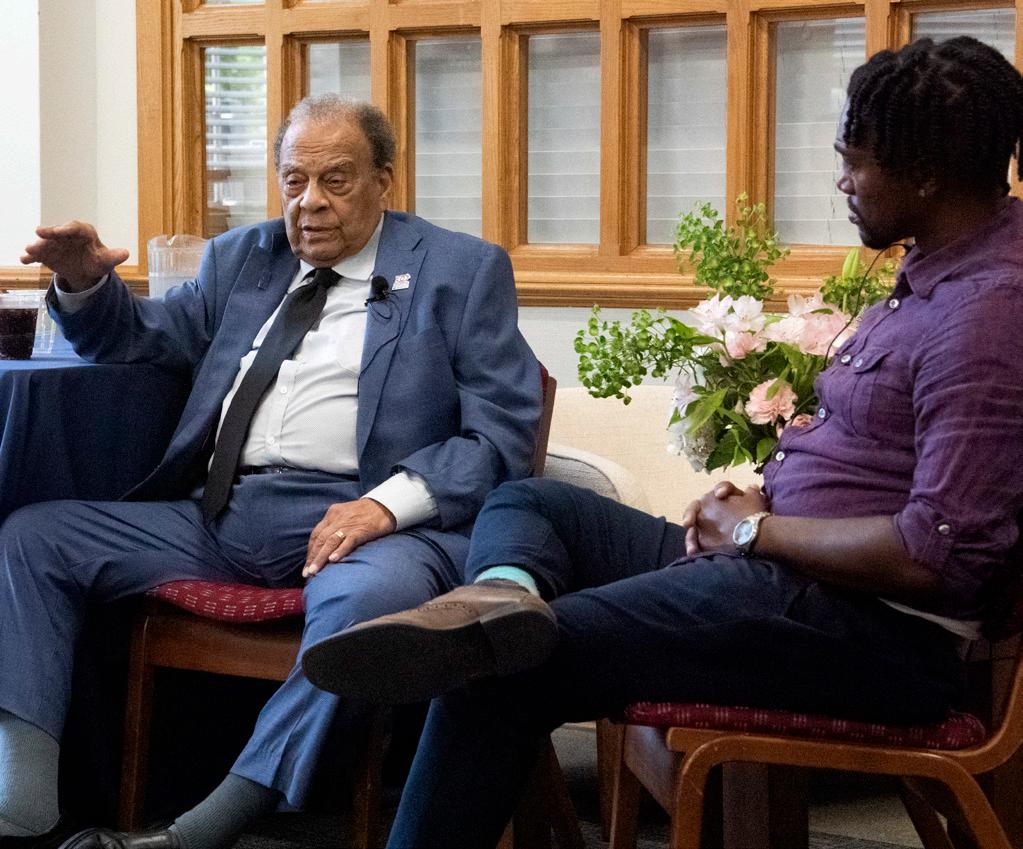

purpose is.’ And, so, that’s been the mantra that has driven me all my life.”
Young, one of the leading figures in the American civil rights movement, a key confidante for the Rev. Dr. Martin Luther King Jr., a former U.S. ambassador to the United Nations, and Atlanta’s former mayor, spent the day engaging with the Columbia Theological Seminary community. This visit was the result of persistent efforts by the African Heritage Student Association who worked alongside Co-
lumbia staff and administrators to coordinate his attendance.
Young addressed students, faculty, and staff in a public conversation hosted by Dean Natasha Patterson. He reflected on his journey to seminary and key moments from his decades of public service. During the event, President Rev. Dr. Victor Aloyo Jr. presented Young with a handmade stole woven in Columbia’s colors, symbolizing the institution’s ongoing commitment to its relationship with him.
He later participated in a student-led discussion moderated by student Jeremiah Wilson, answering student questions and giving them advice on being seminarians and leaders.
A longtime advocate for human rights, Young played an instrumental role in the American civil rights movement as a strategist. He later became an influential figure on the world stage, working to end apartheid in South Africa.
Young is ordained in the United Church of Christ and has remained active in ministry throughout his decades-long career. In addition to serving as ambassador, he represented Georgia in Congress and served two terms as mayor of Atlanta.
His visit offered Columbia students an opportunity to learn from a leader whose faith has guided every step of his career in public service and global advocacy.
“I have had a fabulous life,” Young said to nods. “But not one penny of it, not one fifteen minutes of it, was planned or did I know was going to happen the day before it happened. The whole point I’m making here, and the reason I came out here, is you don’t have to know what you are doing. The Lord has laid his hand on you. And if you’ve got enough courage and vision to go where he sends you, you will have a wonderful life.”
TENIO COUSIN NAMED 2025 DABNEY AND TOM DIXON CREATION CARE PRIZE WINNER
Tenio Cousin (MDiv ’25) is this year’s recipient of the Dabney and Tom Dixon Creation Care Sermon Prize, awarded to the student who writes the best sermon addressing environmental issues. Tenio delivered his winning sermon for the Earth Care Service, led by SAGE, in Columbia’s Harrington Chapel on April 25.
Tenio, who is from Bremen, Ga., studied Music Therapy at Berklee School of Music in 1993. He earned a Psychology degree, along with master’s degrees in psychology and education, from the University of West Georgia.
Tenio has a diverse career background. He has taught special education and science in public and private schools for eight years, directed three Georgia residential treatment homes, and served as a Psychological Operations soldier in the U.S. Army. He also been a private pilot, a college psychology professor, and a cruise ship host and performer. Along with his present studies and a job as a tour guide and host at Atlanta’s Mercedes-Benz Stadium, Tenio has been endorsed as a Navy Chaplain Candidate Officer.
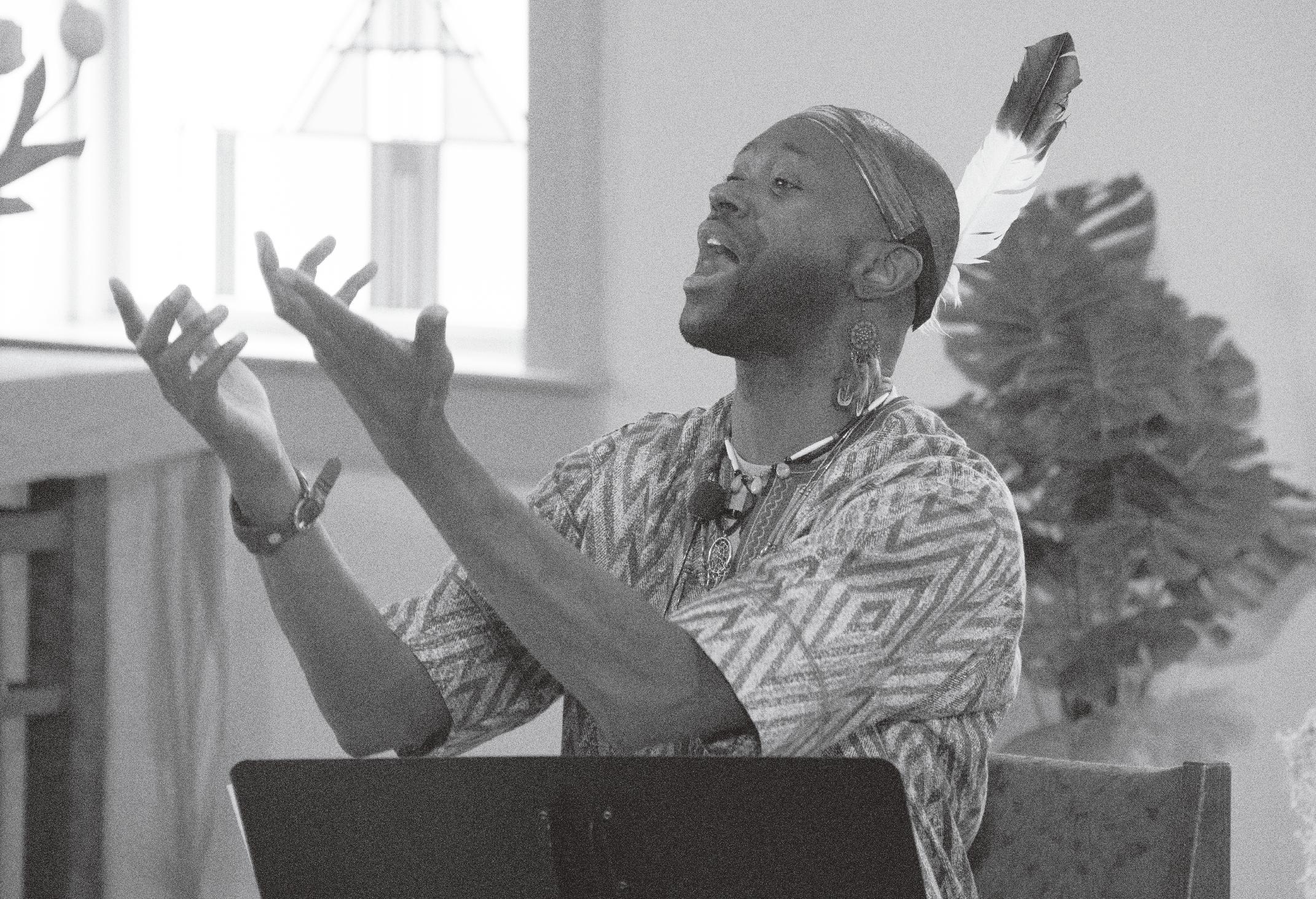
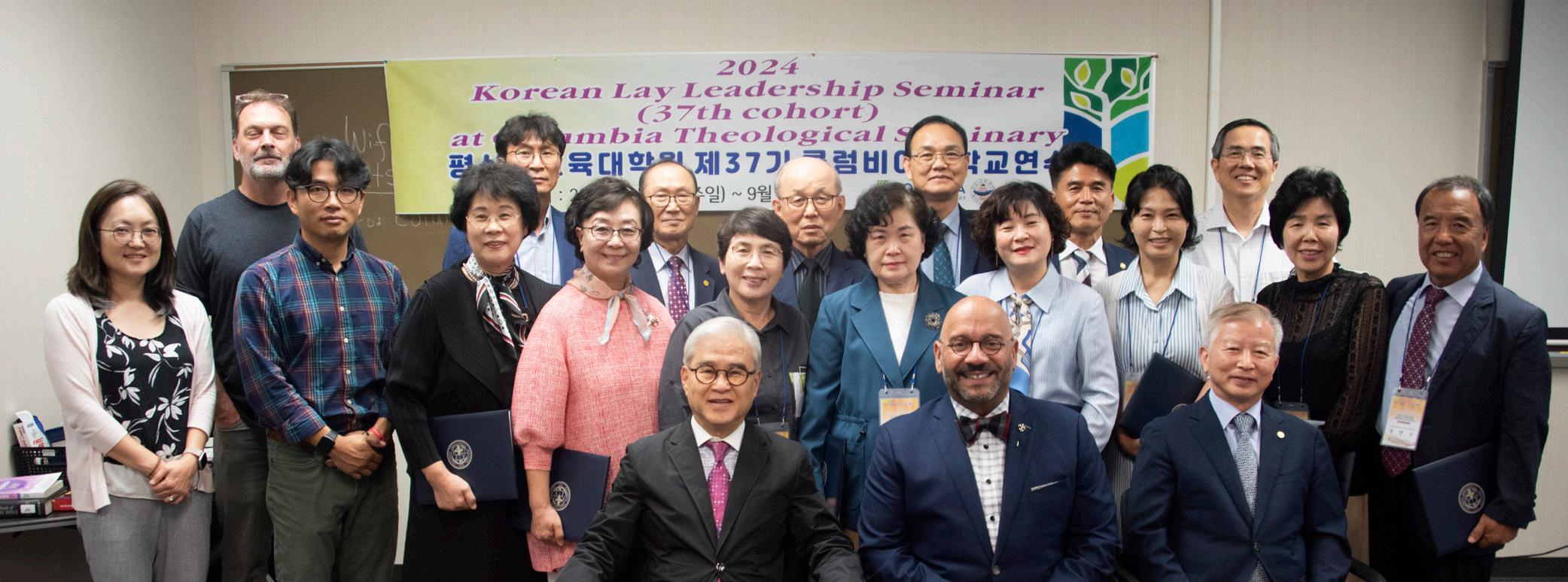
KOREAN LAY LEADERS VISIT COLUMBIA
In September 2024, a group of lay leaders from South Korea were on campus getting a feel for Columbia Theological Seminary and hearing from faculty members and administrators on various topics during their trip to the United States.
The 16 participants are part of a certificate program through Columbia’s partner institution, Presbyterian University and Theological Seminary in Seoul, South Korea. This conference, which is managed by Columbia’s Office of Contextual Education and International Partnerships, stems from a partnership that goes back to the 1990s, but mainly from a memorandum of understanding signed with the Seminary four years ago. It is now an annual sojourn for Korean presbyterian cohorts.
“They are in a two-year certificate program as a elders in the Presbyterian Church Korea,” said Dr. Sue Kim Park, Associate Dean of the Office of Contextual Education and International Partnerships. “After their first year, they come here and after the second year they go to Israel. This is a long rigorous program for lay leaders. They don’t have to do any reading. They are just attending lectures, but it is something they get from the Presbyterian University Theology School faculty. When they come here, they get five lectures from five of our faculty members.”
“But it’s fun. It’s light,” she said. “They’re not here to be super academic. They’re here to listen to what our faculty is doing and what their research is about.”
The group spent four nights and five days at Columbia where President Rev. Dr. Victor Aloyo Jr. also hosted them at his residence. They also went to Decatur Presbyterian Church where Columbia alum the Rev. Todd Speed is pastor. His church has a strong history with the Korean Presbyterian community. A visit to an immigrant church in the area was also scheduled.
After Columbia, the group toured the U.S. East Coast and Canada.

GOD WORKS IT OUT ALUMNI SPOTLIGHT: DR. GARLAND HIGGINS
BY MASHAUN D. SIMON, DOCTOR OF MINISTRY ’25
When Dr Garland Higgins walked across the stage to be hooded and presented with her Doctor of Ministry degree in the spring of 2023, it was a bittersweet moment.
As she celebrated reaching this long sought personal and professional milestone, her sister lay in a hospice several miles away. A few weeks later, her sister died.
“She passed on June 8, or something like that,” Dr. Higgins remarks.

Grief, in one capacity or another, has played a significant role in her life, which is why her work around grief care and support is significant. She used to ask God, “How do I end up in these spaces where people look to me or expect me to get them through” their grieving process. But now?
“I’m perfectly aware that all the grieving that I’ve done in my own personal spaces have prepared me for this now,” she said. “Grief is a lifelong journey.”

Higgins serves on the staff of Antioch African Methodist Episcopal Church in Stone Mountain, GA. In addition to her work in Christian Education at the church and across the denomination’s sixth episcopal district, she also oversees the church’s GriefShare program.
GriefShare operates as a support group for those working through loss. Participants attend weekly discussions over the course of a couple of months. The discussions are led by a facilitator using a biblically based workbook as a guide. Participants
enroll in GriefShare and self-select the group, or site, they want to join for their sessions. Antioch AME is just one of them. Prior to the coronavirus pandemic, groups met regularly in person. But in 2020, all sites began holding their sessions virtually via Zoom. Since then, some have gone back to in-person, but other sites, like Antioch, continue to hold theirs virtually.
“As a matter of fact, the majority of the people who participate in our class are not Antioch members,” said Higgins. “A lot of them don’t even live in Georgia. We had so many people signing up from everywhere. That’s why we have kept it virtual.”
Higgins became familiar with GriefShare in 2022. For nearly a decade, whenever August 18 rolled around, she found herself in physically debilitating grief. The date marked the anniversary of her cousin’s death.
“She was like a sister to me,” Higgins reflects. “For the first five years after she died, I stayed in the bed all day under the covers. I just wanted that day to be over.”
The unexpected death of the woman she considers her “sister-cousin” was another blow in the ongoing saga that was loss in her life. She didn’t have the tools to manage any of what she felt. But she would eventually have the strength to return home to Connecticut and eventually make a visit to the cemetery. When she got there, however, she was faced with another emotion that unexpectedly added to her struggle – anger.
“Her husband never got her a headstone. I’m walking all over the place, looking for her plot, and couldn’t find it because there was no headstone,” she remembers. “They’re telling me she’s right here in this area, but I don’t see her. I don’t see her. They guy walked me over to that empty space and I just fell on the ground.”
When she returned to Atlanta, she started attending a grief ministry that used GriefShare. After she completed the program, she approached the senior pastor of Antioch and said, “I’ve gone through this program over at another church. I think we need to do this.”
Enrolling in the Doctor of Ministry program at Columbia Theological Seminary was not the original plan. Initially, she wanted to do the Doctor of Theology.
“I knew early on, when I answered the call to ministry, that somehow counseling was the direction I would end up in, but I didn’t feel comfortable at the time.”
She had to fight against issues of self-worth, constantly asking herself, “Who the heck am I? Who is going to be listening to me? I’m only, like, 30 plus years old. I don’t know nothing. I’m wet behind the ears.”
Listening to a mentor at the time, someone she refers to as her “father in the ministry,” she settled into the idea that counseling work could be an option further down the line eventually.
“It’s not something you have to do right away,” she remembers him telling her. “There are still so many other things that you need to learn on this journey. This is a lifelong journey, because nobody retires from this.”
She accepted his advice, but she never let go of the desire. She thinks back to when she was a kid, and the very vivid dreams she would have of her talking to large groups of women. But when she was finally ready, the ThD degree program at CTS had been discontinued.
“There was just something about Columbia. Every time I drove past the campus on my way to somewhere else, the campus would also catch my attention,” she said. “Since the ThD was discontinued, it was suggested that I apply for the DMin. Because I was disappointed, I waited another two or three years before I applied.”
When she did apply to Columbia, she decided to concentrate her studies on pastoral counseling.
She is grateful for the detour. The DMin program challenged her in ways she never anticipated. It also provided her with space and time to get more confident in her call and skills. She fuses it all together -- her personal experiences and lessons with grief with the academic rigor and practical ministerial perspective.
“Seeing how ministry has come full circle with my personal life and grief, and now working with grieving people every day of the week has really shown me, ‘Okay, God, you were preparing me for this. Even when my great grandmother died when I was just five years old, and no one explained anything. You were preparing me,’” she reflects. “A lot of my counseling is going to be centered around the things I have lived and the grief that has come with it. Whether it is death, divorce, life changes in general -- whatever it is.”
Her next steps are to become licensed as a marriage and family therapist. She plans to enroll into a program where she can take the required classes needed to take the exam for the license.
“I have learned now that whatever God tells me to do, I just do it,” she said. “I don’t question it. I just do it, because God, you must already have all the little ins and outs worked out. You’ve shown me that over and over and over again. So now when God says, do it, I just do it.”

CARTER FLORENCE, MYERS, AND YOO SPEAK AT 2025 FESTIVAL OF HOMILETICS

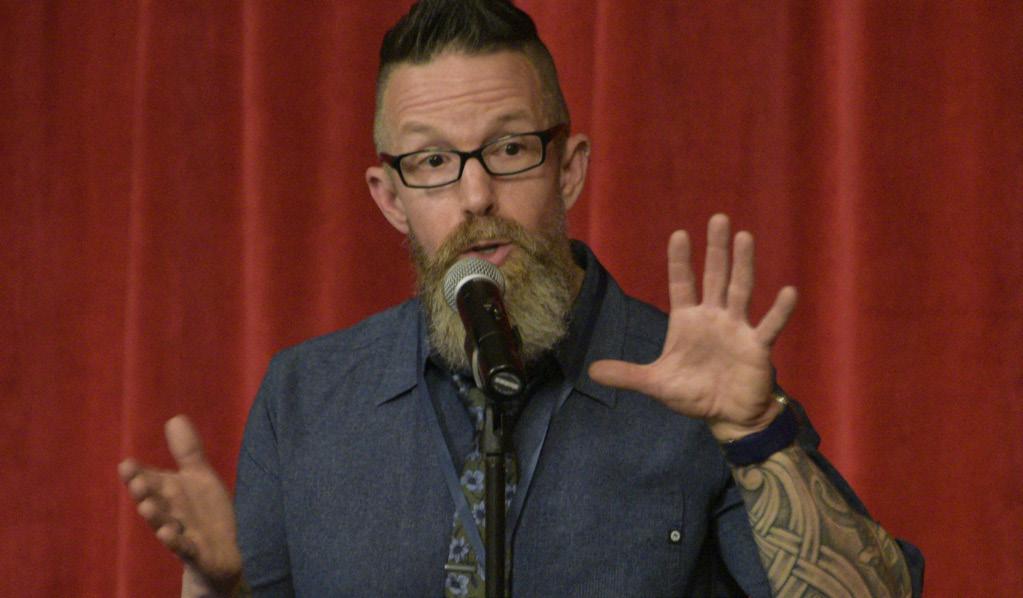
Columbia Theological Seminary professors Rev. Dr. Anna Carter Florence, Rev. Dr. Jake Myers, and Dr. William Yoo each led sessions at the annual Festival of Homiletics which was held May 12-15 at Peachtree United Methodist Church in Atlanta.
Huge crowds gathered for each of the presentations by Columbia’s professors:
• Anna Carter Florence – “Staying Together, Running Aground”
• Jake Myers – “Preaching Jokes to Power: How to Challenge Injustice and Build Bridges Through Humor”
• William Yoo – “The Uses and Misuses of History: Preaching to Make a Real Difference for Racial Justice and Repair”

48 | LANTERN: THE YEAR IN REVIEW SUMMER ’25
IN REMEMBERANCE: WALTER BREUGGEMANN
Dr. Walter Brueggemann served as the William Marcellus McPheeters Professor of Old Testament at Columbia Theological Seminary from 1986 until 2003. A respected theologian and authority on the Old Testament. Brueggemann, who held the title of professor emeritus at Columbia, died in Michigan on June 5 at age 92. The following tribute was written by Dr. Christine Roy Yoder and Dr. Kathleen M. O’Connor.
Obituaries for Walter Brueggemann published in major newspapers highlight his work on prophets, imagination, and power structures viewed through a sociological lens. While these descriptions are not wrong, we—two of Walter’s Old Testament colleagues at Columbia Theological Seminary— think they overlook too much of his life’s work. For Walter, the biblical text was everything: potent and piercing literature, a site of dynamic encounter, and a source of conflicting theological perspectives through which to perceive the world.
Along with other scholars, Walter shifted academic study of the Bible away from compositional history of texts and its relentless parsing of sources. For him, historical scientific methods of the last centuries could contribute only minimally to interpretation because narrow concern with the texts’ creation offered neither sustenance nor solace to the Church. Scholarship’s singular focus on written and oral sources left the text barren and believers thirsty. Walter sought his inspiration elsewhere.
Initially, he turned to the rhetoric of the text, to close readings of what the text says and how it says it. He studied genres, especially narrative and poetry with their subdivisions and language in wealthy abundance. Walter expanded his exploration to study the Jewishness of the Old Testament in both its practices and modes of thinking. He asked what texts might say to historical audiences who produced them: how texts shaped imagination, motivated behavior and, above all, invited relationships with God, the world, and its inhabitants. Walter studied Jewish and Christian reinterpretations of texts to show how multiple meanings emerged from and for different contexts. By dramatizing compelling stories and flawed human characters, as well as the benefits of praise, complaint, and lament, Walter brought the Bible alive and invited readers into the Bible’s conflicts and weighty disputes about theological ideas.


Perhaps at the heart of Brueggemann’s work was his exploration of the character of God. Biblical texts, by their very multiplicity of experiences and viewpoints, their unresolved testimony and counter-testimony, portray an uncontainable God. Across Walter’s work, he insisted that God is at once radically sovereign, righteous, giver of steadfast covenant love (hesed), and immersed in the fray of human existence. God appears in contradictions as generous, mysterious, conflicted, fearsome, hidden, present, punishing, and weak. The Bible names God in numerous ways yet God remains unnameable. Because Walter recognized the literary and historical character of biblical texts, literalism had no home in his work. God never settles into one set of theological names or formulations.
Walter Brueggemann had an amazingly integrative mind. He read and used everything significant that came across his path: literary criticism, poetry, newspapers, psychology, philosophy, political viewpoints, novels, history, as well as theology. Often we spotted him walking across Columbia’s campus carrying stacks of books, by far the most prolific

user of the library and interlibrary loan. He reveled in the arts, including classical and jazz music, theater, and movies (especially on Friday afternoons). These expansive habits gave Walter ample material for his preaching and teaching and provided him with surprising connections among diverse disciplines and biblical texts. His popular descriptions of orientation, disorientation, and reorientation, to name functions of the psalms, for example, drew from philosopher Paul Ricoeur. And Walter laced his lectures and sermons with psychotherapeutic insights gleaned from thinkers such as Sigmund Freud and D.W. Winnicott.
Walter’s disciplined study and interdisciplinary work burst forth not only in publications but also in performance. He was a performer of texts. In the classroom he did not simply narrate or comment on a text; he enacted it. Columbia students surely remember Walter marching back and forth, pushing the imagined Philistine donkey cart as if it were a modern golf cart carrying the captured ark of the covenant. Or his poignant depiction of David’s grief at the death of his son Absalom. “Absalom, Absalom,


my son Absalom!” Or his commentary about David’s ability to keep his hands clean from political crimes much like a mafia boss in a contemporary movie.
These classroom enactments involved carefully paced speech. This was evident immediately with the opening prayer, usually crafted that morning on a manual typewriter, where Walter used the language and challenges of the assigned text to offer thanksgiving and petitions for the day. Then, in his lectures, he would move through the text unit by unit, swearing, yelling, and then, in an instant, whispering words of denouement. He lingered over verbs and repeated phrases and key words for emphasis and insight. He underlined the force and effect of Hebrew terms with chalk dust flying. His enormous vocabulary and attention to the poetic power of words gave his performances shape and meaning. With high energy, he made the details of the text immediate and memorable and, by doing so, brought into relief possible implications of the text that were vital and urgent.
Walter’s work on prophetic imagination broke new ground because he pressed beyond analysis of individual oracles and historical settings. He embraced a broader vision of the prophetic vocation. He saw prophecy functioning to overturn hardened worldviews and give birth to alternative social visions of just societies. But beyond this early major work, Walter Brueggemann wrote more than 100 books, many of them also major contributions to other areas of biblical studies. About the abundance of his publications, he often joked, quoting imaginary incredulous colleagues, “What are you calling it this time?”
His books include commentaries on Psalms, Jeremiah, Genesis, and Isaiah. He revived laments for churches that had long since stopped praying them as faithful expressions of loss and grief. He interrogated power structures created by Saul, David, and Solomon, who usurped power from local leaders and constructed royal systems and oppressive worldviews. Walter’s many studies of
Exodus highlight the metaphoric power of the brick yard and the liberation of slaves as a potent narrative that prepares for the Passover liturgy and covenant living according to the law of Moses. And then there is his magisterial Old Testament Theology. There Walter exposes across the canon conflicting testimonies about the character of God, historically constructed perceptions that are in unresolvable conflict yet always push toward faith in God.
Beyond his many volumes, Walter composed numerous essays, articles, book reviews, and collected volumes of sermons and prayers. He presented papers and participated in panels at professional meetings. He drew his ideas from liberation theology, feminist theology, black theology, postmodern theories, and critical analyses of consumerist culture. In his academic work, Walter conversed with and sought directly or indirectly the wellbeing of the Church and world. He wrote in ways that reached diverse audiences, crossed denominations, and challenged conventional thinking about faith and culture. Threaded through his work are favored themes of radical justice and divine care for the poor, the afflicted, and the oppressed.
Much of this vast amount of writing Walter accomplished on yellow legal pads, now archived in over 150 banker’s boxes of published and unpublished work in the C. Benton Kline, Jr. Archives at Columbia Seminary.
To our continual astonishment, Walter wrote in full sentences and complete paragraphs, though only a few people could decipher his handwriting. For good or ill, his hand and brain were connected directly, Walter would say, and for him to work on a computer interfered with his flow of thought. Scrawled out, his writing was nearly publishable before the ink dried.
Walter’s brilliance and creativity as a scholar, preacher, and lecturer garnered him widespread respect, about which he hardly said anything to

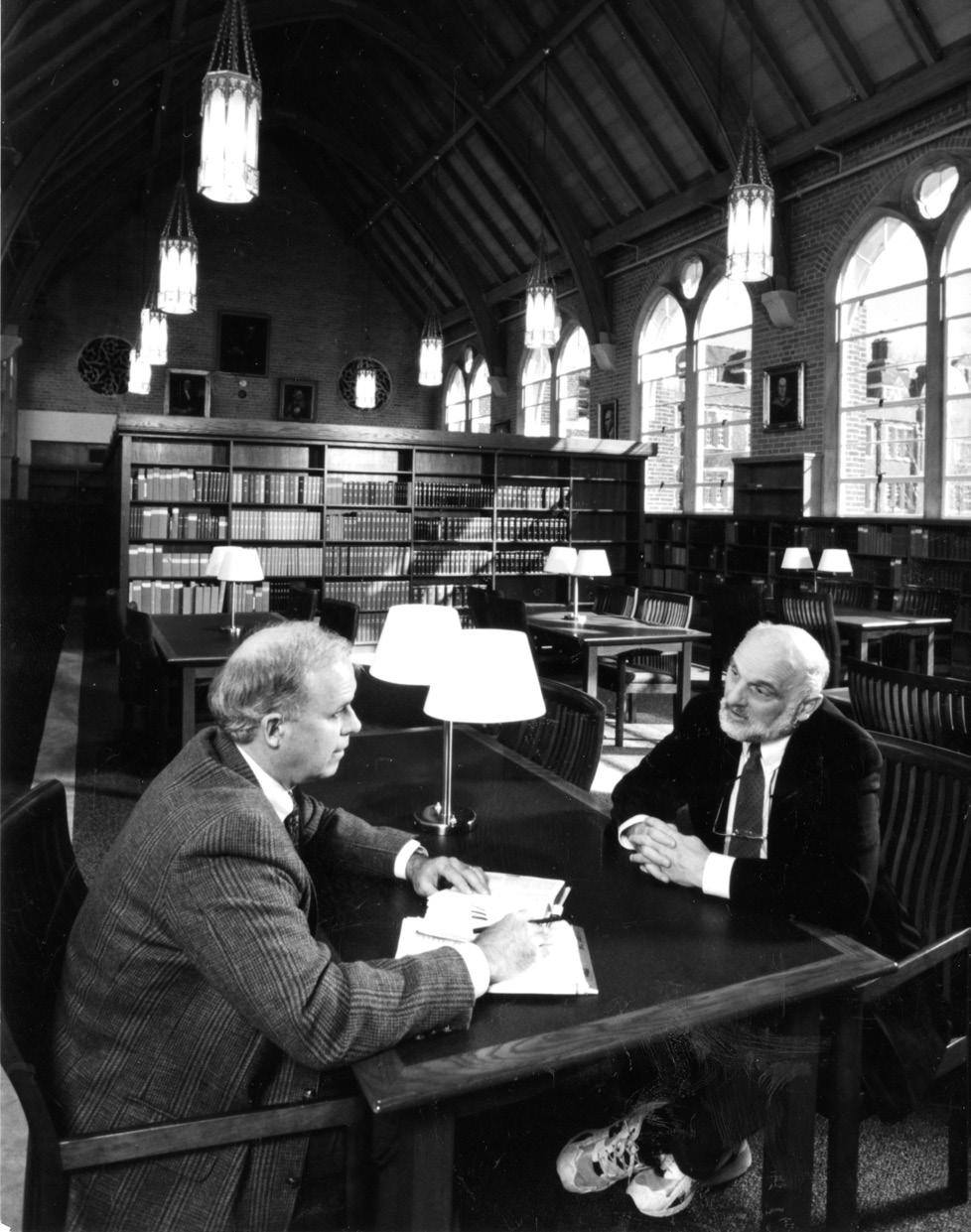
his colleagues. He served as the President of the Society of Biblical Literature in 1990. He was awarded a Niebuhr Medal from Elmhurst College. He was one of the first prestigious Henry Luce III Fellows in Theology, and he received eight honorary doctorates.
Despite the ways he expended his energy as a scholar and teacher, he was an engaged institutional citizen and a friend and colleague to so many. He came prepared to meetings concerned with the good of the institution. He argued with his colleagues and often saw larger implications of plans and projects. He could also occasionally be gruff, abrupt, and dismissive of ideas. We two always experienced Walter as a most supportive colleague. He made a point of sharing articles or books with us and others that he thought might be of interest or support research we were doing. He mentored generations of biblical scholars and was often a pastoral presence to students. He was renowned among us for his handwritten notes and emails to celebrate, grieve, and appreciate life’s moments, as well as to comment on committee developments and offer jokes for the day. He wrote thank you notes for thank you notes. His energy seemed boundless, for even as he was teaching, writing, and serving Columbia, he also engaged with local churches on a regular basis as his own worship home and as an extension of his commitment to theological education. It was great fun to be around him in our offices in Richards Center, where he said repeatedly that what we did was better than working. We laughed a lot. About news, the churches, the absurdities of life. Despite invitations to take appointments elsewhere, Walter chose to abide at Columbia, perhaps because his commitment to forming pastoral leaders for the church was a top priority. He took seriously the life of a theological educator.
We are deeply grateful for the privilege and joy of having known and worked with Walter Brueggemann. We stand with the great cloud of witnesses who grieve and remember him. And we are certain that his work matters now more than ever to the Church and the world. Rest in peace, good and faithful servant.
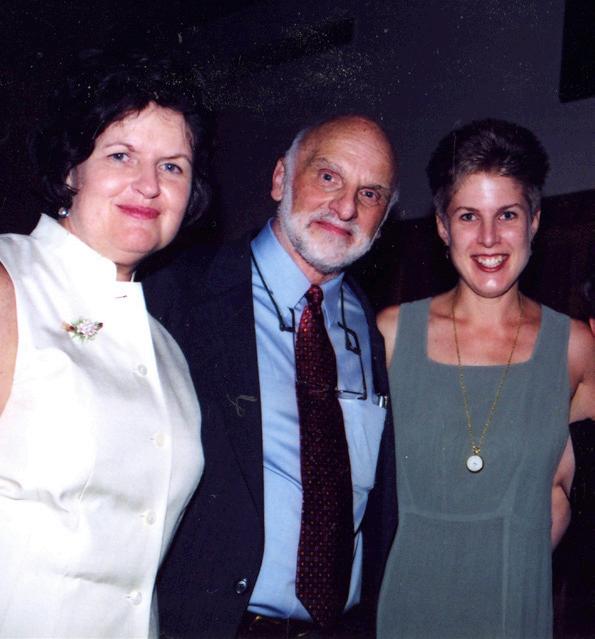
Remeberence by Dr. Christine Roy Yoder, Senior Vice President, Dean of Faculty and Academic Affairs
J. McDowell Richards Professor of Biblical Interpretation; and Dr. Kathleen M. O’Connor, William
Marcellus McPheeters Professor of Old Testament Emerita. All photos are from The C. Benton Kline, Jr. Special Collections and Archives in the John Bulow Campbell Library at Columbia Theological Seminary.
Read more about Dr. Brueggemann at www.ctsnet.edu/remembering-dr-brueggemann/
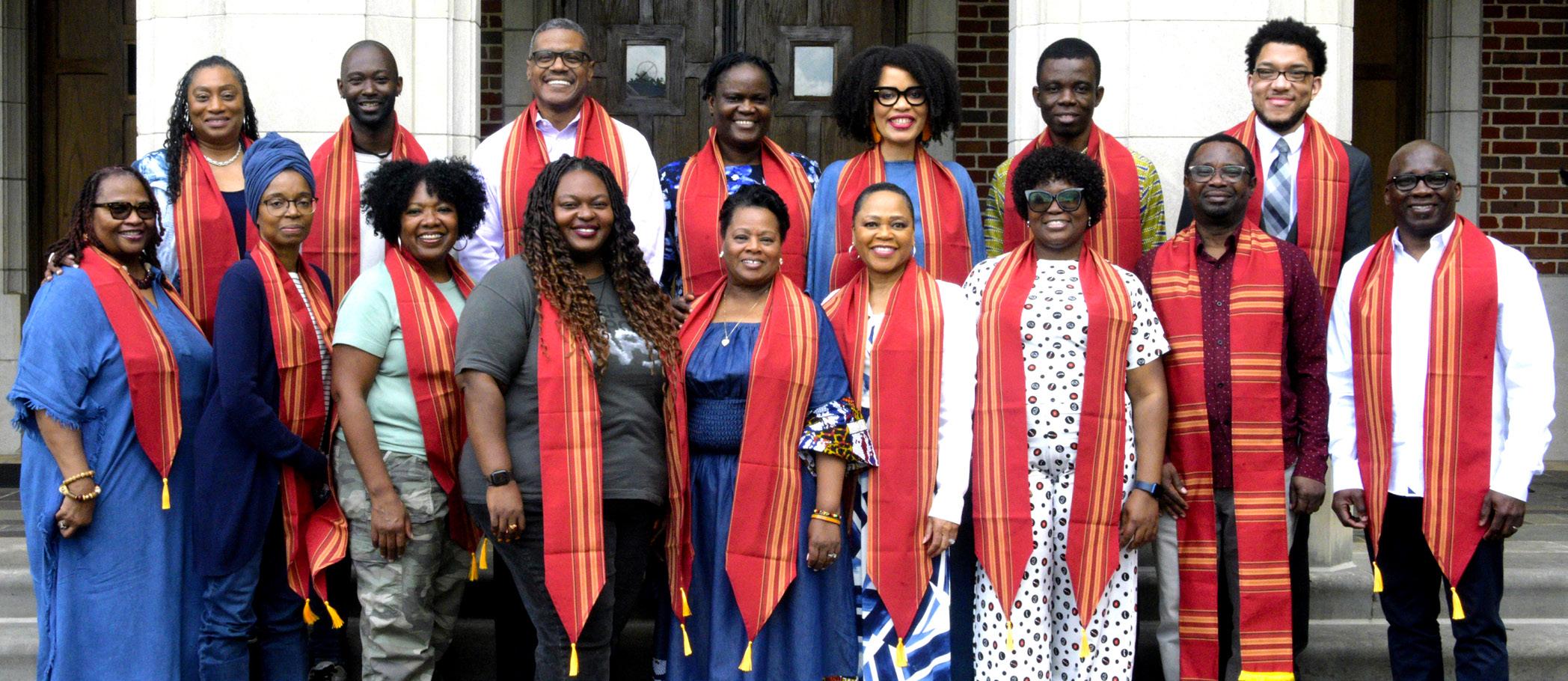


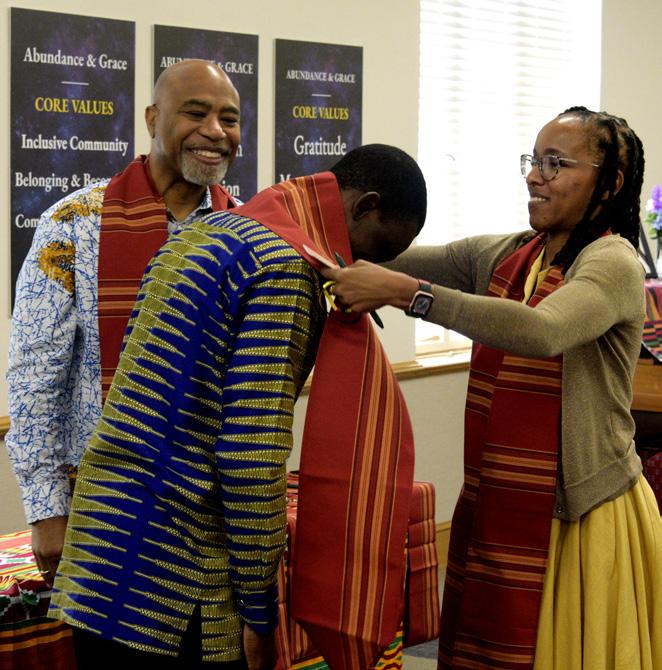
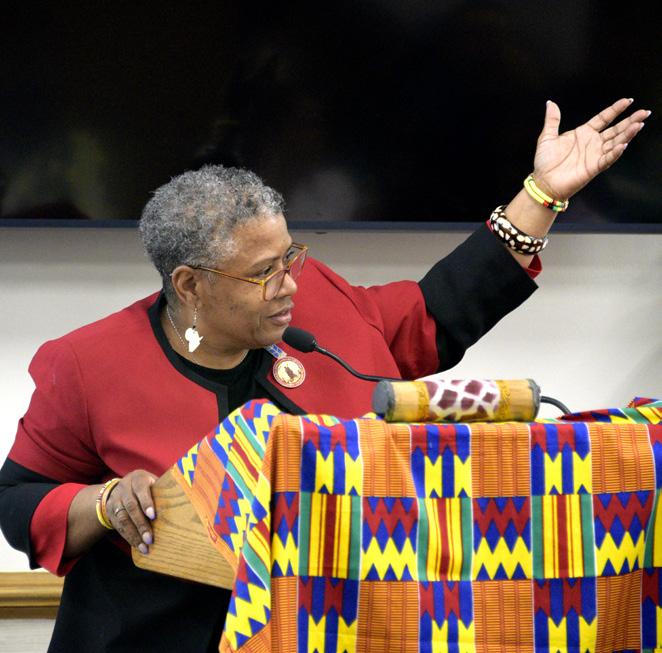
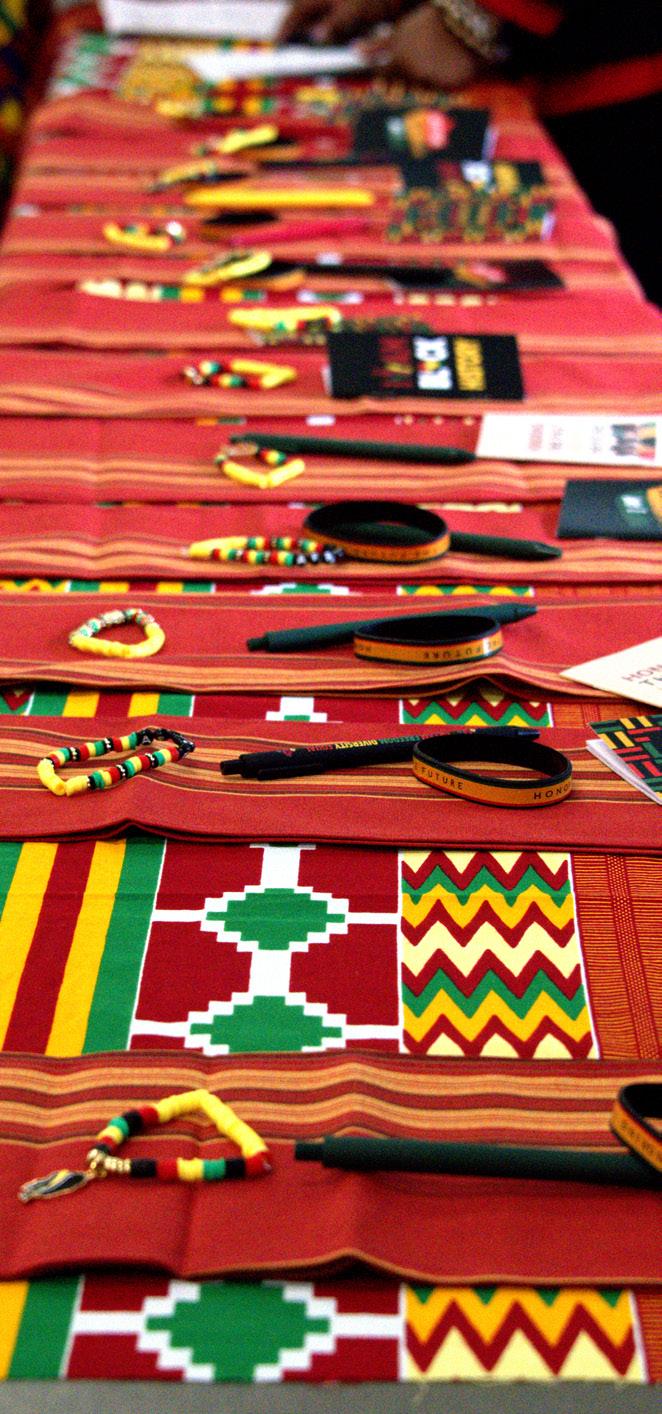
| LANTERN: THE YEAR IN REVIEW

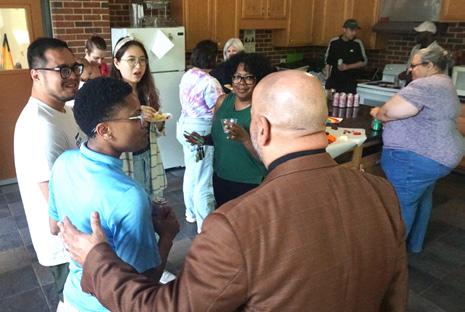
STUDENT CLUBS GATHER TO HONOR GRADUATES
Previous Page: Students, faculty, staff and alumni gathered to honor African Student Heritege Association students with a commisioning ceremony. The African Heritage Student Association provides space for students whose background heritage is linked to and/or influenced by the African diaspora and those who support the advancement and celebration of this heritage at Columbia.
This Page: Imago Dei, Columbia’s student organization that seeks to promote the welcome and inclusion of all people, especially those who identify as part of the LGBTQIA+ community., gathered to honor LGBTQI+ graduating students entering ministry.


TEACH UNTIL THE STONES CRY OUT
The Columbia Class of 2025 received their spiritual send-off during an inspirational Baccalaureate ceremony at Decatur Presbyterian Church.
Along with soul-stirring singing, encouraging words from President Rev. Dr. Victor Aloyo Jr., and Dean and Vice President of Student Formation and Campus Culture Rev. Dr. Katherine Threadgill, speaker Rev. Dr. Renita Weems, Chief Academic Officer and Dean of Gammon Theological Seminary, told graduates that they have to stay true to their training and resist becoming “performers.”
“So, the question for this generation isn’t can they sing the Lord’s song in a strange land, but will they sing it truthfully,” she said. “Will you sing it courageously? Will you preach and teach and lead in ways that resist being merely admired and insist on being followed, even when it costs?
“This is your Ezekiel moment. Your Berlin Wall. Your Edmund Pettis Bridge…. And God is calling you to not to just speak, but to live the kind of ministry that demands a response.”
“So, this is what I want for you. Do not become performers in pulpits. And those of you not called to pulpits, do not become passive in your calling. Whether you advocate in courtrooms or hospital corridors or you show up in city hall as justice workers, do not let your ministry become muted. Do not become theologians of convenience. Do not let your calling be reduced to a title or a credential. Do not let your sermons become performances. Preach so that the bones or until the bones rattle. Teach until the stones cry out. Serve so that even exile becomes holy ground. Trust your training, yes, but more than that, trust the God who trains in the wilderness, who forms us in the exile, who breathes purpose with the brokenness and who still raises prophets, like you. Preach so that the bones may rattle.”
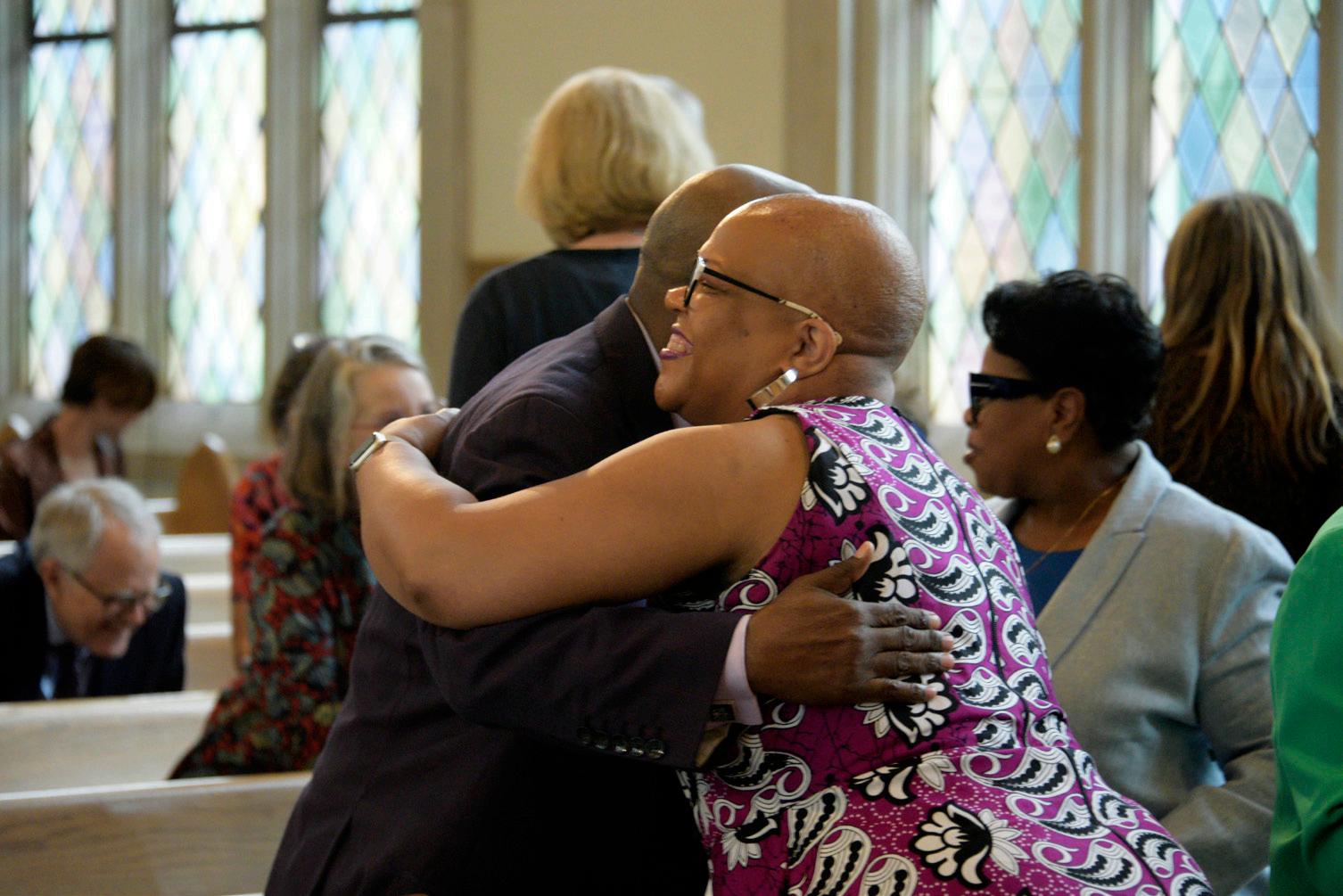


58 | LANTERN: THE YEAR IN REVIEW
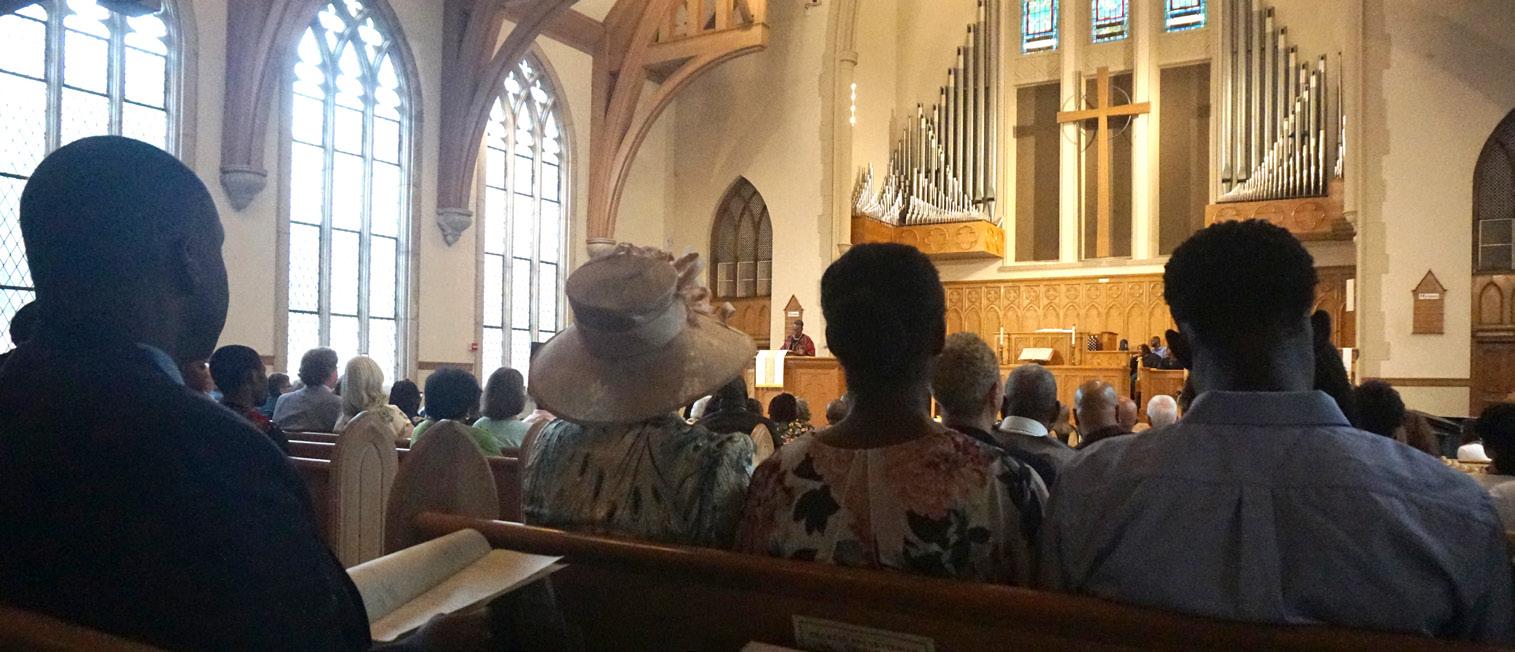


NOT SEPARATED FROM BUT JOINED WITH

On a mild, sunny morning at Trinity Presbyterian in Atlanta, degrees were conferred to Columbia’s most recent class of graduates. The day was marked by laughter, tears of joy, and an abundance of cheering not only celebrating the end of formal studies, but of the beginning of new ministries, set to transform the Church in the world. We celebrate this latest class even as we move forward, putting our faith in motion and looking for where Christ leads us next.





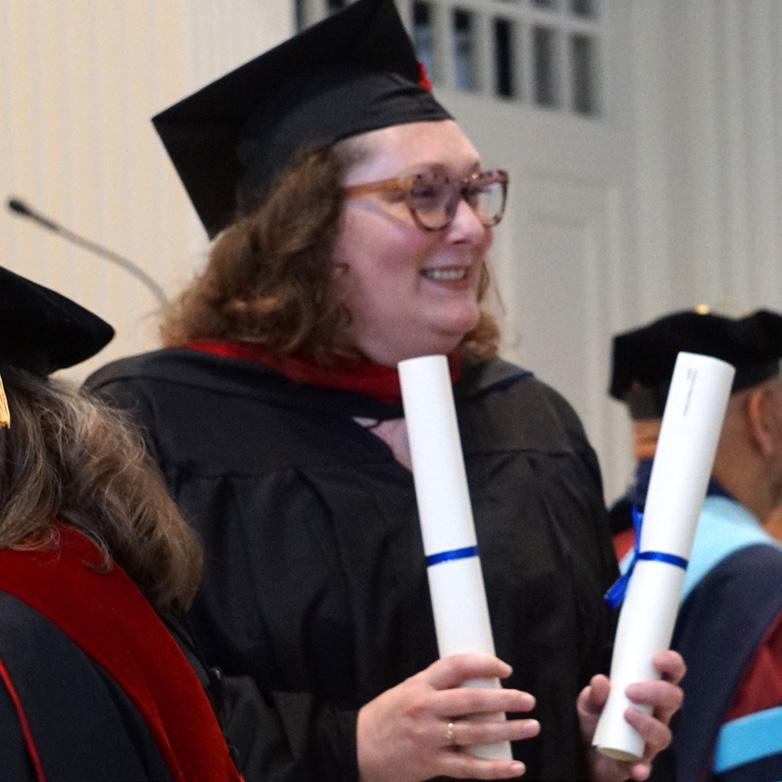


62 | LANTERN: THE YEAR IN REVIEW SUMMER ’25

COLUMBIA
SEMINARY

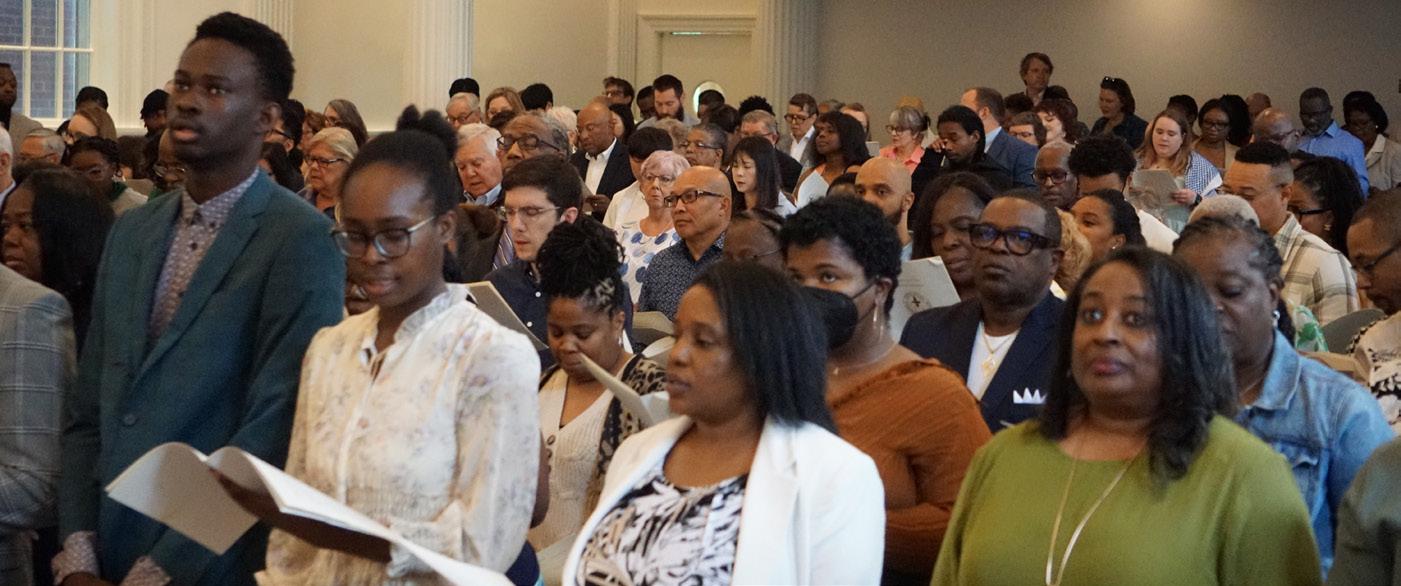
| LANTERN: THE YEAR IN REVIEW
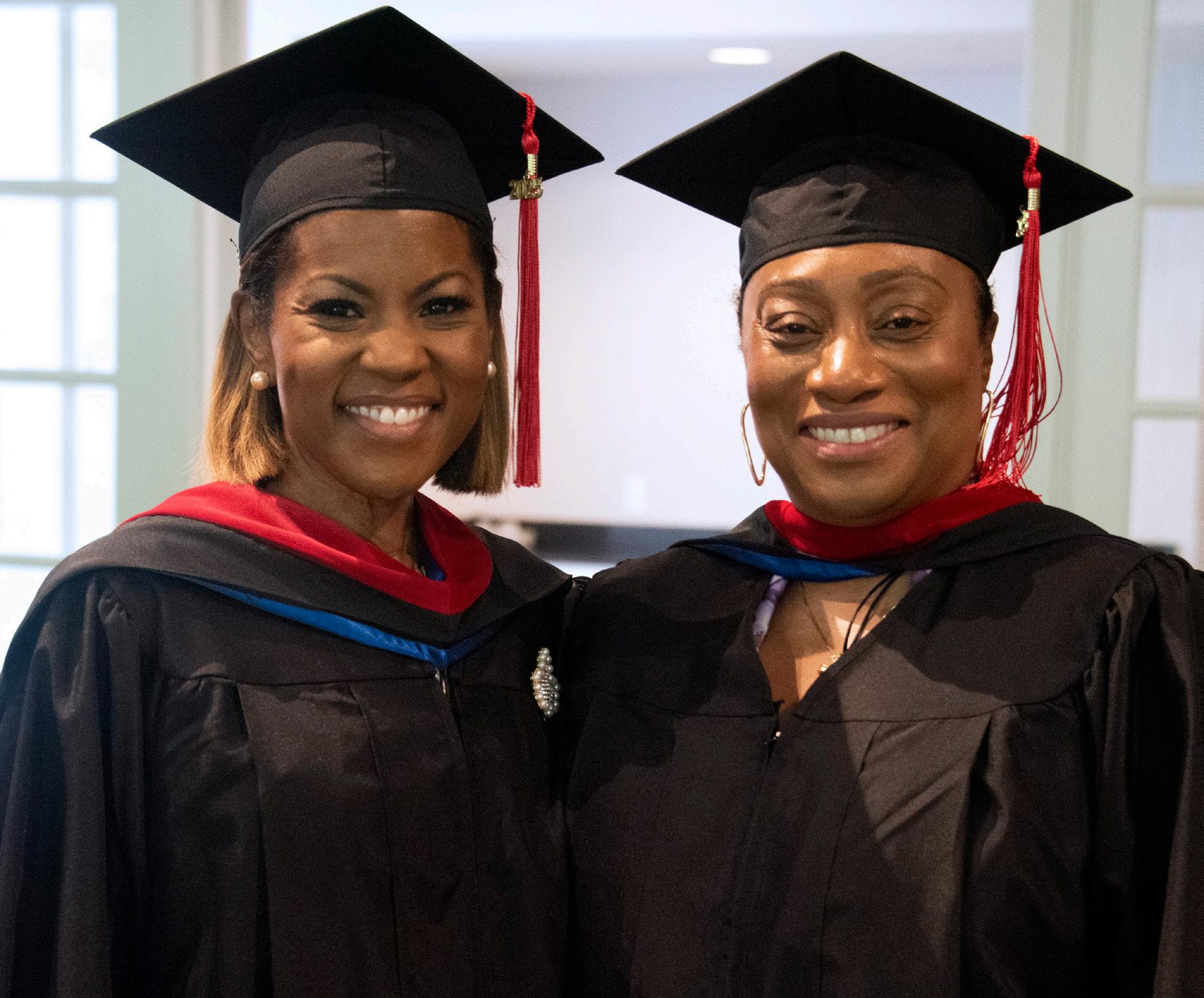

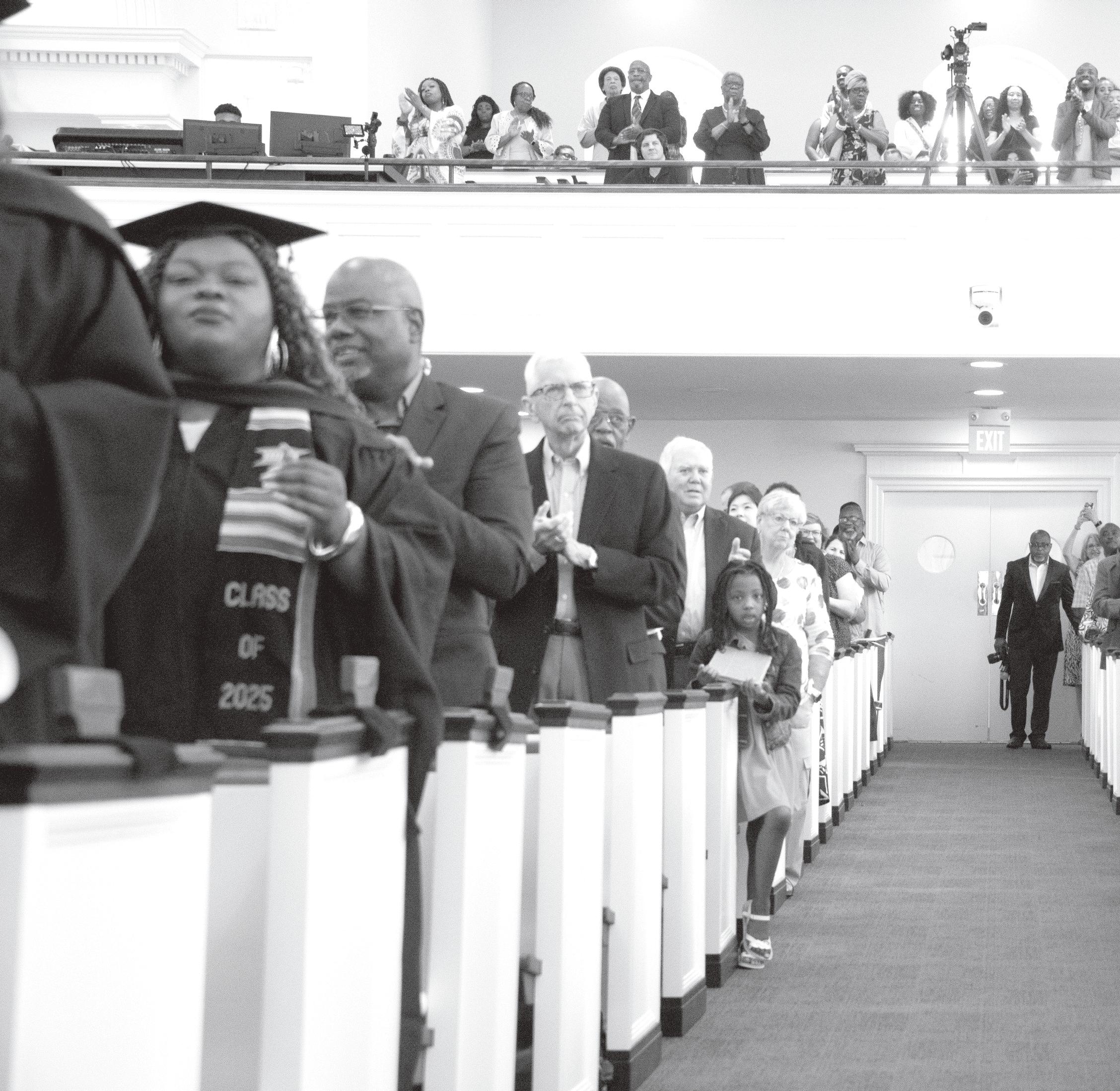
| LANTERN: THE YEAR IN REVIEW
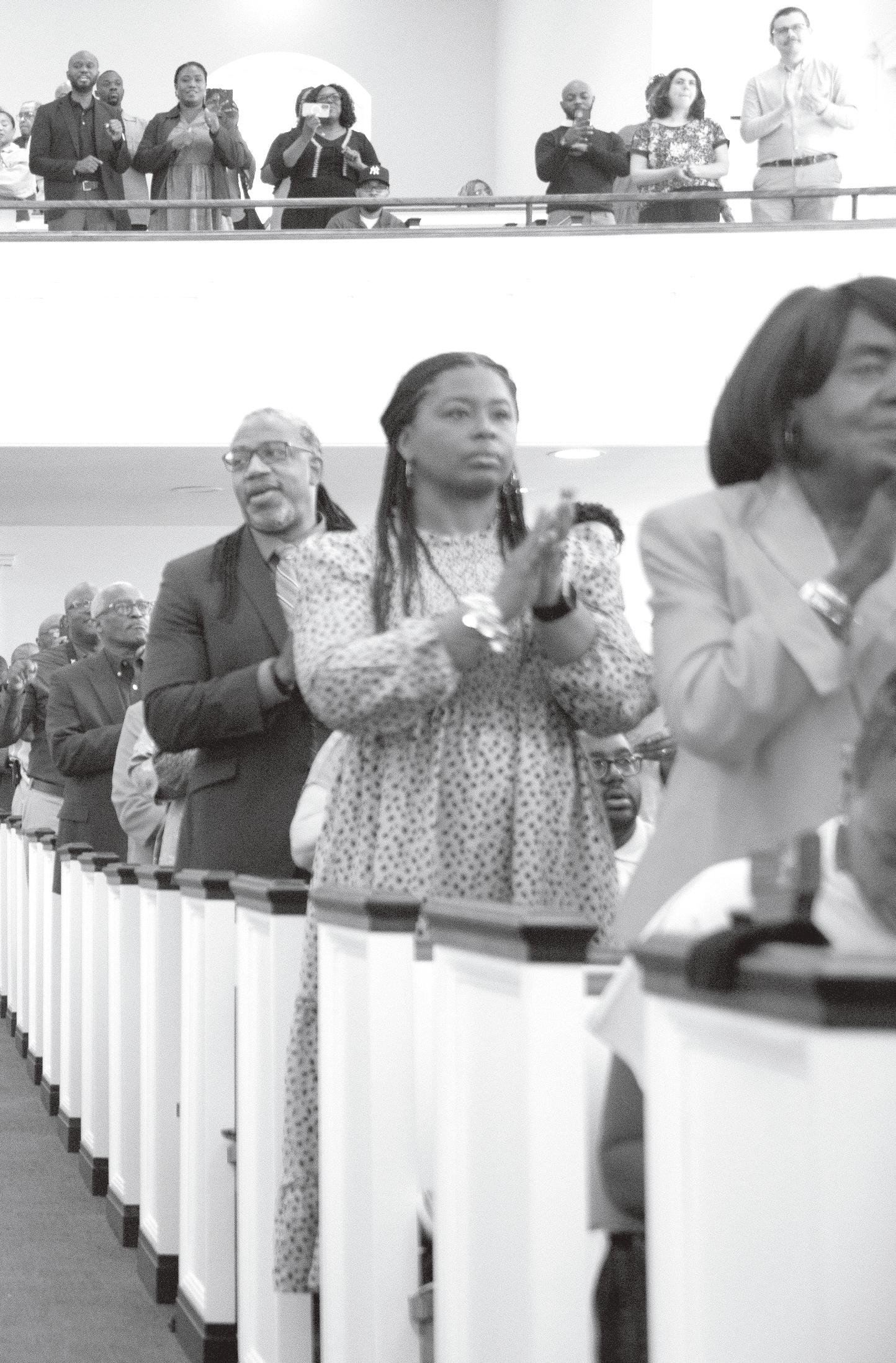

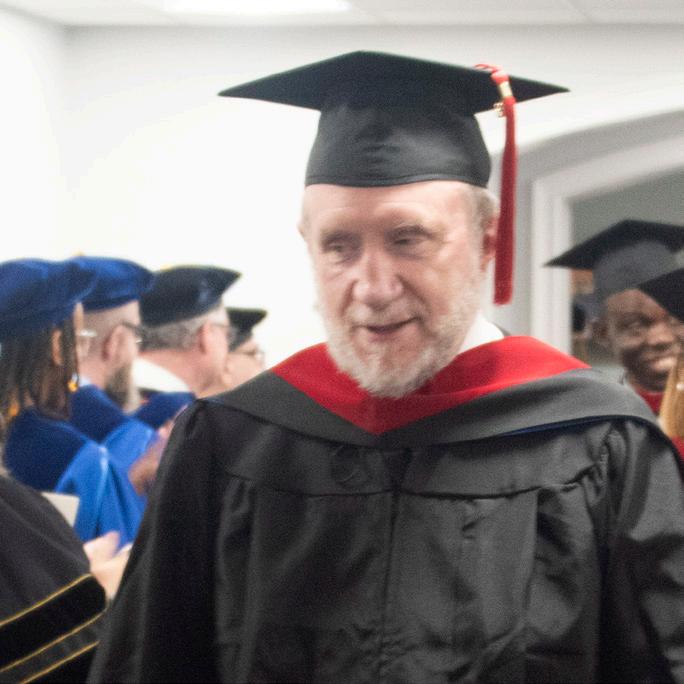

COLUMBIA THEOLOGICAL SEMINARY

BACK ROW left to right: Tenio Sanchez Cousin (MDiv), Anthony Denard Miles (MDiv), Olubunmi Roseline Ladipo (MDiv), Jabari Marcus McKie (MDiv), Joseph Andrew Boatright (MDiv), Catherine Edward Moore (MDiv & MAPT), Wei-Cheng Tseng (MAPT)
MIDDLE ROW: Daniel Hyoan Kwon (MDiv), Anitra Nicole Manning (MDiv), Johnnie Kathryn Burger (MDiv), Lakeva Tashawn Brown (MDiv & MAPT), D’Ondre’ Mapp (MDiv), Gary Dean Burgess (MATS), Summer Rachelle Richardson (MATS), Jiyeong Seo (MAPT)
FRONT ROW: Angela Oliver Bailey (MDiv), Laura Lynn Booth (MDiv), Susan Bedford Landrum (MDiv & MAPT), Laura Mickensie Neely (MDiv), Montisa Anntoinette Watkins (MDiv), Marielle C. Thomas (MATS), Vallena Moss (MDiv), Angela B. Moore (MDiv & MAPT), Oluwaseun Y. Adetutu Obidipe (MAPT), Delores Ann Burgess (MAPT), Eishah Terrene Smith (MAPT)
GRADUATING
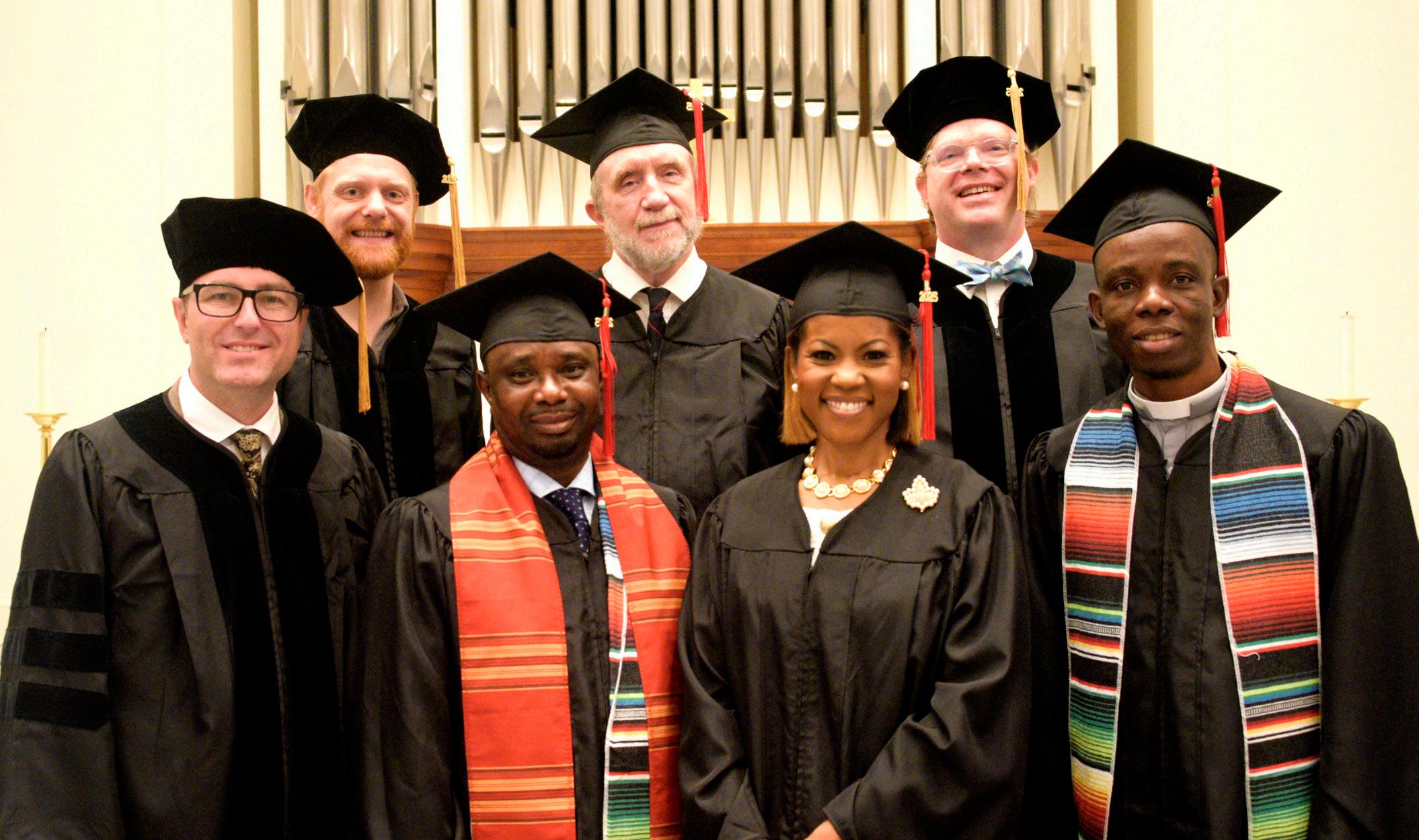
BACK ROW left to right: Curtis James White (DMin), Dennis O. Kitchens (ThM), Richard Morgan Whitfield, Jr. (DMin)
FRONT ROW: Jonathan Scott Hauerwas (DMin), Edward Boachie (ThM), Nicole Dionne Hawkins (ThM), Mordecai Akwafo Gorleku (DMin)
NOT PICTURED:
Michele L. Bechtell (MATS), Sun Young Choi (MDiv), Keith Andrew Grogg (DMin), Sharia Dionne Hall (MDiv & MAPT), Matthew David Henderson (DMin), Alycia Lafavor (MATS), Loan Thi Nguyen (MAPT), Huashi Amy Park (MATS), Yoonhee Park (MDiv), Deinah Lorpu Quire (MDiv)
COMMUNITY CALENDAR
There is always something going on at Columbia. Here are a few of the important dates or events we are hosting or will be joining in the next few months!
ON CAMPUS: New International Student Orientation
August 25–26
New Student Orientation
August 27–29
ON CAMPUS: Classes begin September 2
ON CAMPUS AND VIRTUALLY: Every Tuesday @ 2:22 Shalom Selah Prayer Join the Columbia community for a monent of prayer and reflection
LET’S CONNECT! Presbyterian Youth Workers Association National Gathering San Diego, California October 6–8
ON CAMPUS: Reel Theology Dinner & Movie Event Sinners
September 12 5:30–9
ON CAMPUS: Convocation September 5
ABOUT THIS ISSUE
EDITORS
Jennifer Cuthbertson
Add Seymour. Jr.
Corie Cox
LET’S CONNECT! Jesus and Justice Young Adult Advocacy Conference Lansing, Michigan September 26–27
DESIGN AND ILLUSTRATION
Corie Cox
ON CAMPUS: Board of Trustees meeting, October 6–7
ON CAMPUS: International Food Festival October 7
PHOTOGRAPHY
Add Seymour Jr. Corie Cox
Vincine Brown MDiv ‘27
Additional photographs from the C. Benton Kline Special Collections and Archives
LET’S CONNECT! Forum for Theological Exploration: Festival of Discernment
Atlanta
October 8–11
LET’S CONNECT! NEXT Church
National Gathering
Grand Rapids, Michigan
November 11–14
LET’S CONNECT!
Outdoors Ministry Connection: Great Gathering
Lake Junaluska, North Carolina
November 12
CONTRIBUTORS
Jennifer Cuthbertson
Add Seymour Jr.
Corie Cox
Mashaun Simon DMin ’25
Dr. Israel Galindo
Dr. Helen Blier
THE CENTER FOR LIFELONG LEARNING: Contemplative Living I: Contemplative Practices in Daily Life (Online) September 13–December 6
THE CENTER FOR LIFELONG LEARNING:
The Spiritual Wisdom of Trees October 8–11 Montreat Conference Center, Montreat, NC
Seminary CLOSED for Thanksgiving November 24–28
THE CENTER FOR LIFELONG LEARNING OFFERS A ROBUST SCHEDULE OF COURSES, CLASSES, AND PROGRAMS. LEARN MORE BY SCANNING HERE OR ctsnet.edu/academics/lifelong-learning/
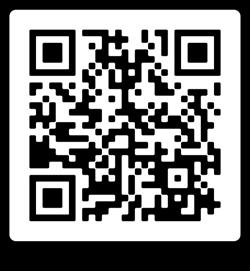
OUT AND ABOUT Visit our Faculty page online to find out where our faculty will be.

SAVE THE DATE! 2026 Alumni Reunion Feb. 25–27
UP NEXT: Lantern Fall 2025 Students and Alumni Issue
Safiyyah Abdullah MDiv/MAPT ’28
Onuche Ajodo MDiv ’27
Dr. Jake Myers
Dr. Kathleen O’Connor
Dr. Cristine Roy Yoder
Rev. Dr. Victor Aloyo, Jr.
Letter from Dr. Aloyo p. 10
Living Into Our Values
ps. 6, 8, 12
Baccalaureate p. 56
Convocation p. 60 2024
Convocation p. 10
Creation Care Sermon p. 42
Prepared for a Common Calling p. 16
Alum Dr. GarlandHiggins p. 44
Faithfully Onward p. 20
701 S. Columbia Drive
Decatur, Ga 30300
Clubs Celebrate 2025 Graduates p. 54
Dr. Adamah Joins Faculty p. 24
Dr. Mitzi Smith Chair Innauguration p. 32
Ambassador Andrew Young Visits Columbia p. 40
Remembering Dr. Walter Brueggemenn p. 48
Community Calendar p. 70
Non-Profit Org. U.S. Postage PAID
Permit No. 40 Decatur, GA
